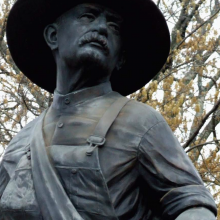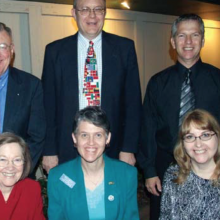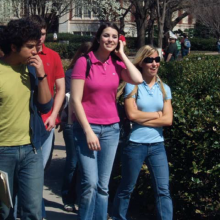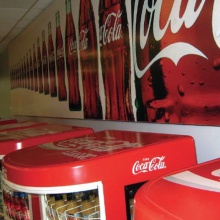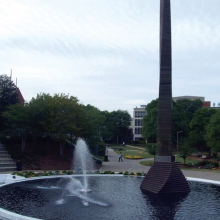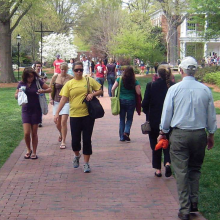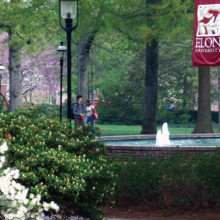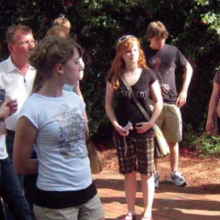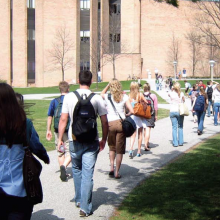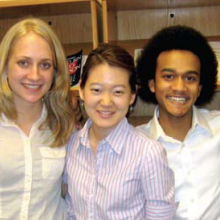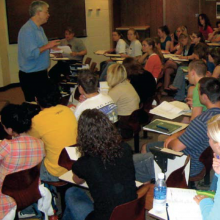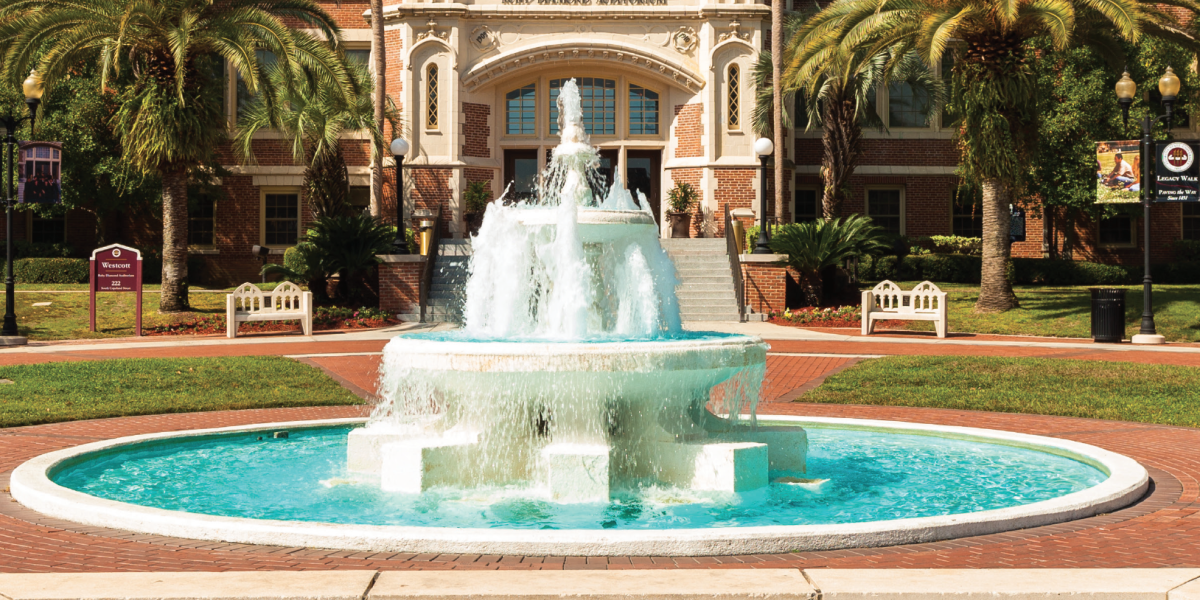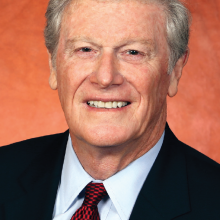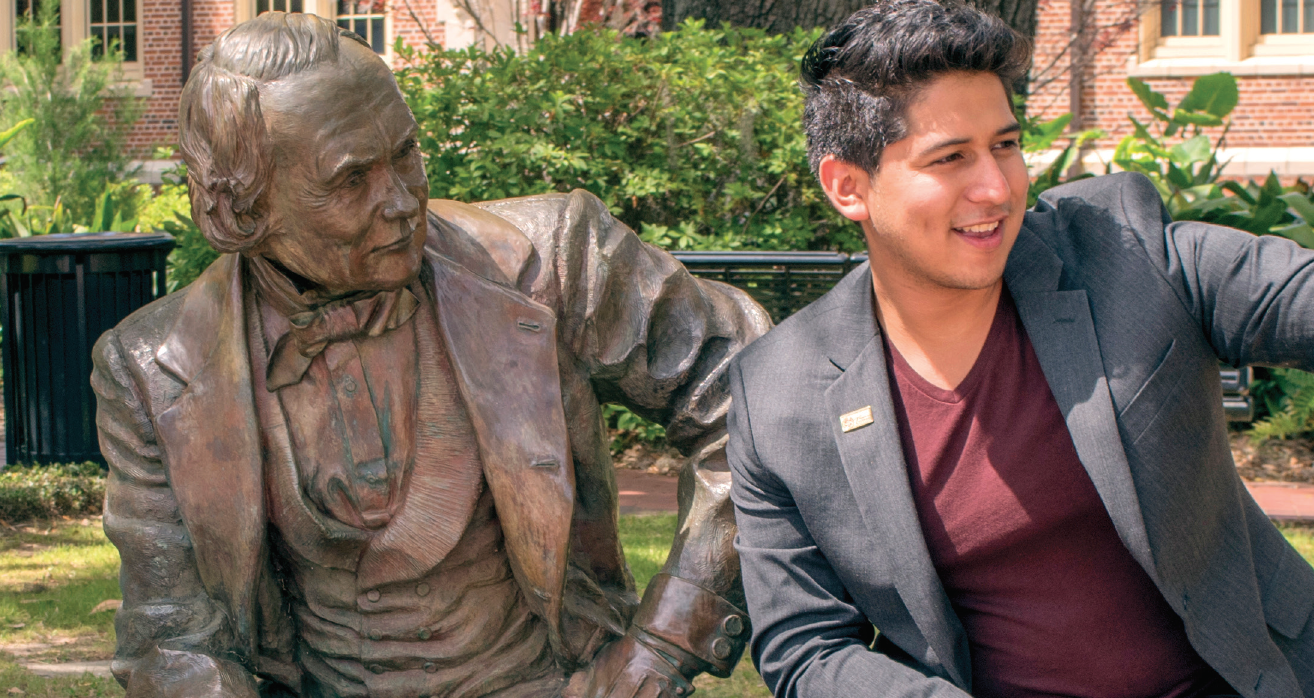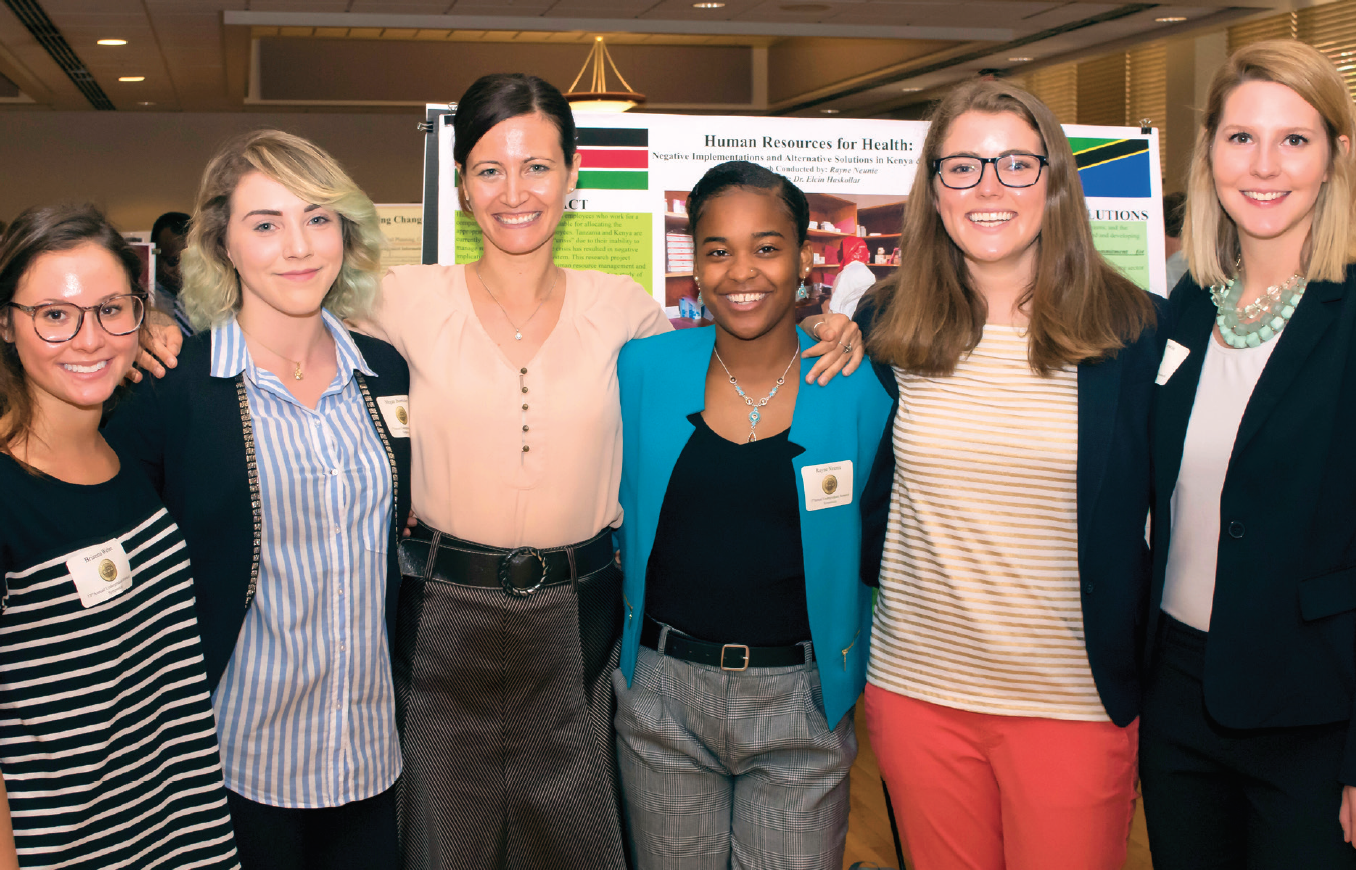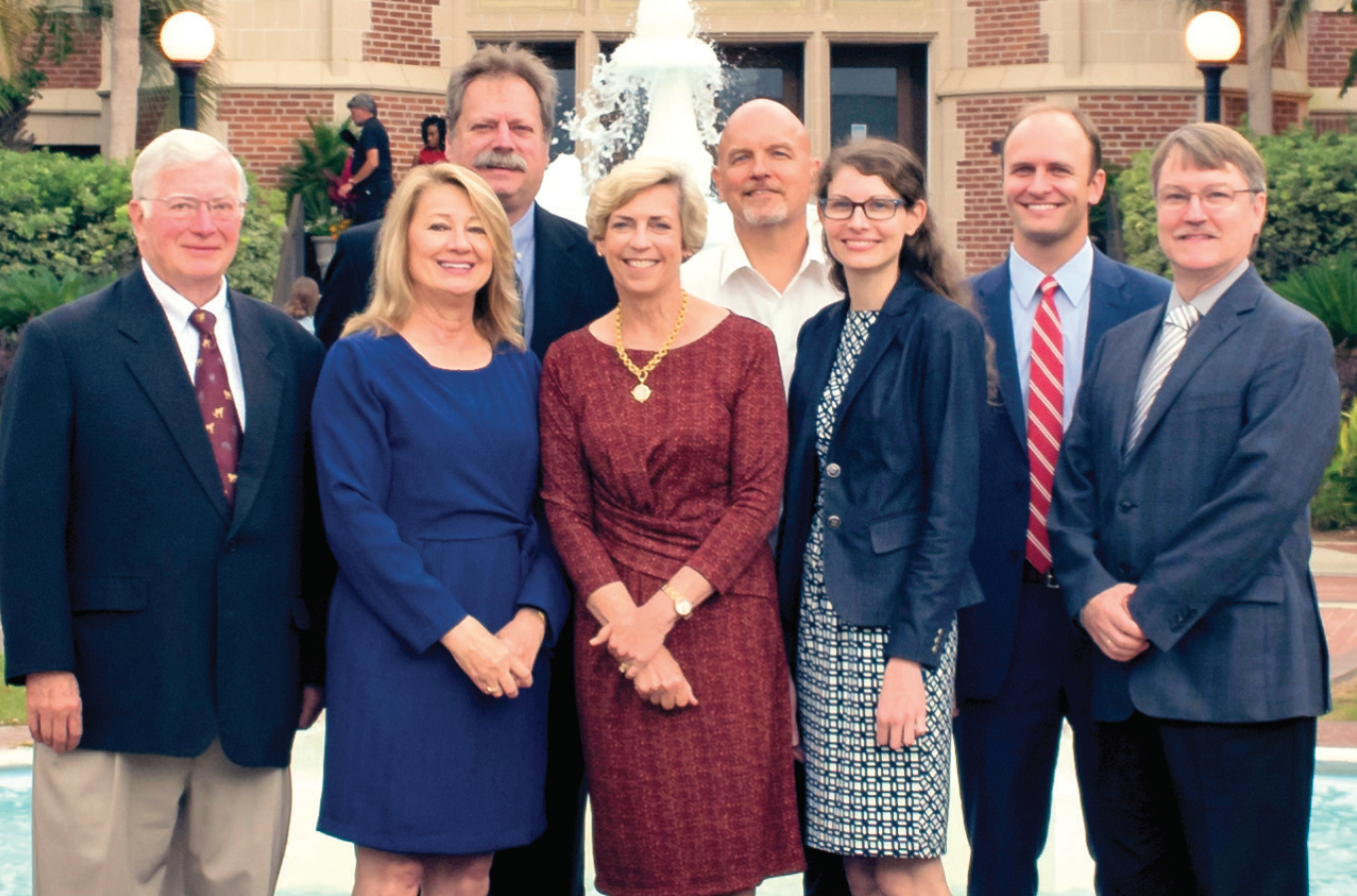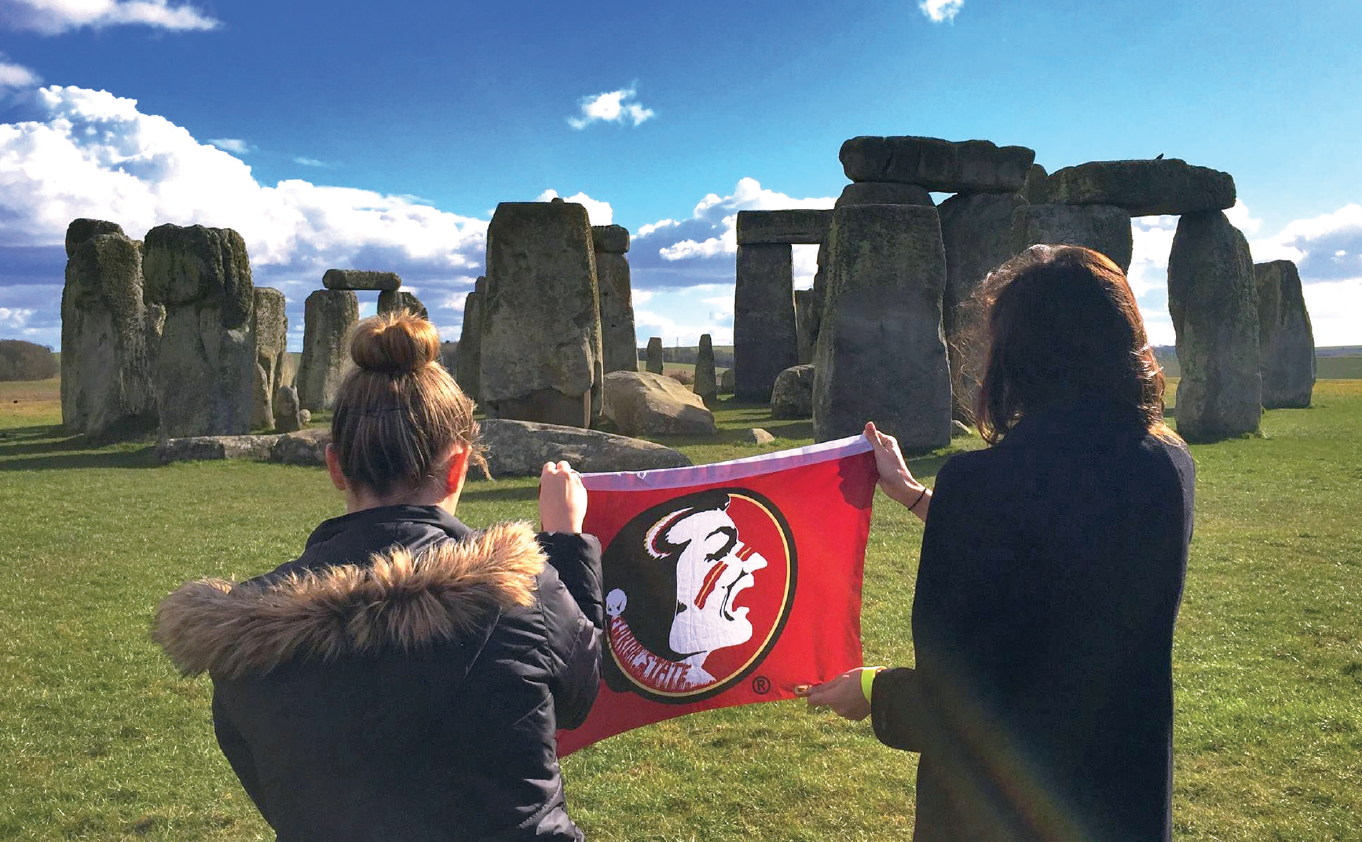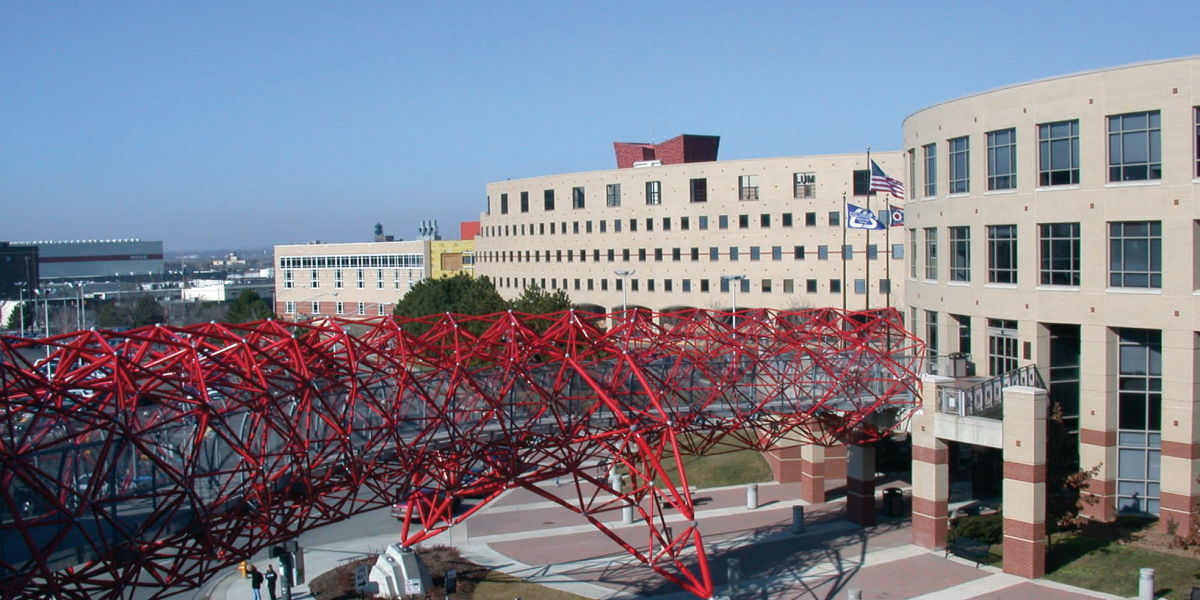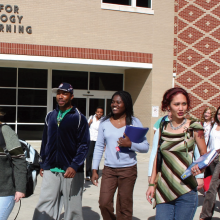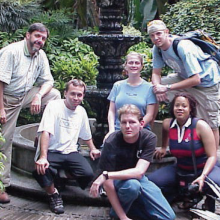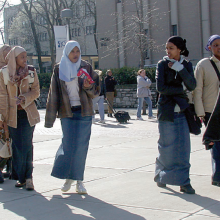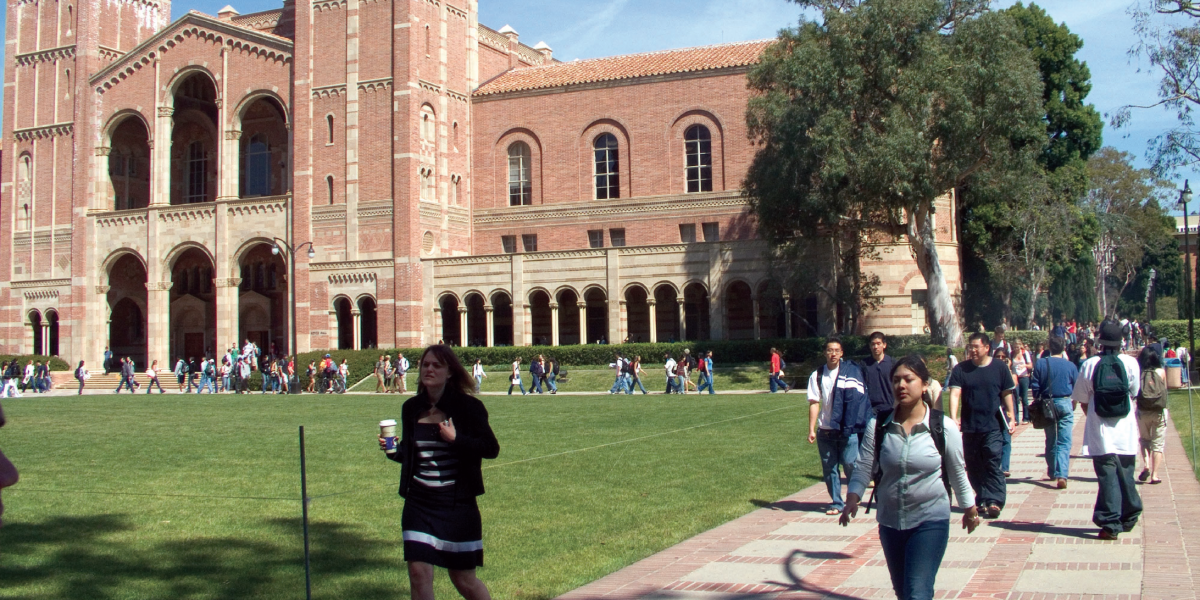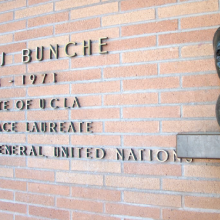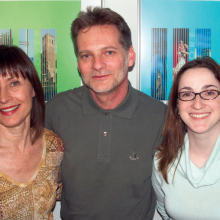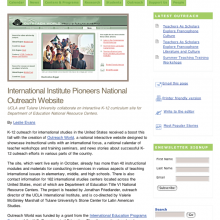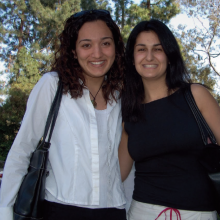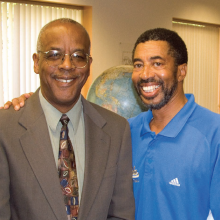Relationship Cultivation
2007 Comprehensive University of Oklahoma
A stranger visiting the University of Oklahoma’s graceful campus in Norman, Oklahoma, who drives down David L. Boren Boulevard, or strolls into the David L. Boren Honors College, or spies the statue of David Boren in a cornice on Evans Hall might assume that Boren led the university during its glory days.
He did—and still does. For the University of Oklahoma, these past 13 years since David L. Boren relinquished a powerful seat in the U.S. Senate to lead his alma mater are the glory days. In writing a new chapter in a life of public service, Boren has presided over a period of dramatic growth and growing confidence for the University of Oklahoma. Sooners have always taken kindly to Boren, the former Rhodes Scholar and politician. They elected him governor at age 33 in a near landslide in 1974, and he won his last Senate race in 1990 with 83 percent of the vote. On his watch OU has quadrupled the number of endowed professor chairs, raised more than $1 billion, and erected dozens of new academic facilities. Even the powerful football team has added a seventh national championship to its trophy case. (A predecessor, George Lynn Cross, once quipped that he wanted to build a university of which the football team could be proud.)
Befitting a former chair of the Senate Select Committee on Intelligence and a man for whom a federal study abroad scholarship is named, Boren has given international education pride of place in OU’s curriculum and activities and made the Norman campus a regular stop for world leaders from Margaret Thatcher to Mikhail Gorbachev. Soon after taking office in 2006 as Africa’s first elected female head of state, Liberia’s President Ellen Johnson-Sirleaf visited at the invitation of Boren and Ambassador Edward J. Perkins, OU’s senior vice provost for international programs and former U.S. ambassador to Liberia, South Africa, and Australia.
Spurt in International Studies
Oklahoma has boosted study abroad by providing $250,000 in international travel grants and fellowships for students and faculty; three-quarters goes to students. OU has added 15 faculty positions in Chinese and Arabic languages, Asian philosophy, history and politics, the economics of development, European security and integration, international business management, and other disciplines. The School of International and Area Studies, launched in 2001, has grown from three dozen to 350 majors. “It is a hard-charging group,” said political scientist Robert H. Cox, the founding director. “We require them to study abroad for at least a semester and take at least two years of a language.” Suzette Grillot, an associate professor of political science, says the myriad of international events held on the Norman campus “gets students energized. They learn something about the world here, and that energizes them to go out and actually see that part of the world or study the issue.” Perkins, who was ambassador to South Africa during the final tumultuous years of apartheid, says, “When we first started this, we heard from some professors, ‘Don’t be ridiculous. Anybody who wants to study international relations is going to go to some place back East to study.’ Well that’s not true at all.”
Of the 23,000 students enrolled on the Norman campus, 1,551 are international students. Oklahoma has forged exchange agreements with 173 partner universities in 60 countries and each year hosts approximately 750 visiting students while sending an equal number off to study at those institutions. Millie C. Audas, director of Education Abroad and International Student Services, notes that in addition to enriching the education of thousands of students, the exchanges also have produced at least 89 marriages. The ebullient Audas, a Bolivian-born former language professor with an OU doctorate in higher education administration, received a second doctorate in honoris causa from Université Blaise Pascal in Clermont-Ferrand, France—OU’s oldest partner—in 2005 for building Oklahoma’s exchange enterprise over nearly three decades. “I was honored not for any research, not for any academic advancement, but for the human relations and the human attachments between the people of France and the people of the United States. That was glorious for me,” said Audas, whose husband, William Audas, is a retired OU director of career services and founding director of the J.C. Penney Leadership Center at Price College of Business, in which numerous international students participate.
Audas first came to Norman as a language instructor in 1978. When she became the first full-time director of Education Abroad and International Student Services in 1986, she quickly found kindred spirits across the faculty, including cell biologist Paul B. Bell, Jr., who had done extensive research in Sweden and shared her enthusiasm for study abroad and partnering with institutions overseas. “By having all these exchanges, we have significantly increased the diversity of international students at OU,” says Bell, now vice provost for instruction and dean of the College of Arts and Sciences. Audas still travels the world to oversee existing exchanges and strike new compacts. “It’s labor intensive to make all these collaborations and agreements live. They are not just on paper. But we’ve had incredible momentum, rhetoric, and funding from President Boren,” she says.
Boren’s Days At Balliol
President Boren recalls with a smile that on his first visit to campus as president-elect, “Millie Audas intercepted me on the sidewalk and said, ‘Can I walk with you? I’ve been waiting all my career for someone like you to become president of OU.” Boren immediately proclaimed her his “soul mate.” Boren needed no convincing about international education. A congressman’s son, he was elected president of the Yale Political Union and won a Rhodes Scholarship to Oxford after graduation in 1963. He was at Balliol College when word came that President John F. Kennedy had been shot; he was still there 14 months later when Britain bade farewell to its great wartime leader, Winston Churchill. “I learned so much about my own country by being outside it,” says Boren.
During Oxford’s long reading periods, he trekked to more than 30 countries across Europe and the Middle East. Boren also volunteered with the speaker’s bureau at the U.S. Embassy in London, speaking before ladies’ garden clubs in little towns across England. It left him convinced of the importance of being a good listener and seeing the world through others’ eyes. Boren believes it crucial for OU students to explore the world beyond the Red River. “Oklahoma is in the middle of the country. We have one of the lowest percentages of any states of first-generation Americans and the highest percentage of people born in this country,” he says.
OU Cousins
Soon after their arrival, Boren and wife Molly Shi Boren, a former teacher and judge, got into a conversation with a student from Malaysia who helped cater an event at the president’s house. “I said to him, ‘How many American students have you gotten to know really well while you’ve been here?’ and he said, ‘Not very many. We international students tend to stay together,’” Boren recalls. The young man expressed regret that he had not gotten to visit an American farm nor seen any “real cowboys.” The Borens’ offer to escort him to a friend’s ranch came too late; he was flying back to Malaysia in two days. “We felt terrible,” the president said. They decided to see to it that other international students would not miss such opportunities.
And so OU Cousins was born, a volunteer organization that matches U.S. and international students and arranges social outings and activities capped by a springtime barbeque with country music and line dancing in a big barn on a ranch outside Norman. “We tell everybody to dress up like cowboys and cowgirls. The international students really look like the part,” said Boren. The program, which started with 300 participants, now draws up to 1,000 each year. After the terror attacks of September 11, 2001, when Boren exhorted the campus community to make OU international students feel welcome, 1,600 students signed up. Other universities have borrowed the concept and even the Cousins name from OU’s friendship experiment, according to Kristen Partridge, assistant director of student life, who still corresponds with her “cousin,” a Singapore engineer she befriended as a sophomore in 1996.
Like many major universities with sizeable international student contingents, Oklahoma has a host family program called Friends to International Students that arranges for local families to invite students into their homes, take them grocery shopping and make sure they have a place to spend Thanksgiving and the winter holidays. Susan and Lyndal Caddell, Norman school teachers, have hosted students from more than a dozen countries on three continents, often several at once.
They’ve taken them to rodeos and the Cowboy Hall of Fame in Oklahoma City, but the international students’ favorite outing is when the Caddells bring them to big family cookouts. “A lot go, ‘Wow! You have aunts and uncles and everyone else here, just like home,’” said Caddell. “It’s a lot different from the image of America they get from TV and movies.”
Getting Outside the Comfort Zone
In welcoming freshman, Boren always reminds them about the importance of “getting outside their comfort zone” and befriending OU’s international students. “Don’t ever let it be said that (a future prime minister) was in your class at Oklahoma and you didn’t know them,” he says. At every major academic convocation, a phalanx of international students bearing their countries’ flags marches behind bagpipers and the Kiowa Blacklegging Society, a group of Native Indians in feathered headdresses.
It takes an effort, too, for international students to breach their comfort zones. When twins James and John Akingbola of Lagos, Nigeria, enrolled as freshmen in 2003, they hung out at first only with Nigerians. When their older brother—who went to college in Britain and later earned a MBA at Purdue University—came to visit, “he wasn’t happy. He told us, ‘You’re not really maximizing your time here. Why don’t you just break out of your bubble and see what’s out there for you?” That was all the push they needed. James Akingbola, 21, became involved with the 150-member African Students Association and moved up the ranks of OU’s International Advisory Committee (IAC), which coordinates the activities of more than two dozen international student organizations. Akingbola, a chemical engineering major, was IAC president in 2006-07 while former IAC President Kenah Nyanat, a petroleum engineering student from Borneo, Malaysia, was elected president of OU’s student government. “I used to be very shy. I couldn’t speak to anybody alone. I depended on my twin to do the talking,” said Akingbola. “It’s so great to know different sets of people.”
The University of Oklahoma Alumni Association has gone international, too, recently adding clubs in Venezuela and Colombia to others across Europe, Asia, Latin America, and the Middle East. Jim “Tripp” Hall III, vice president for alumni affairs, calls the growth “astonishing.” In Moscow, alumni gather in the middle of the night to watch satellite feeds of OU football games, especially the annual showdown against the University of Texas. But in Brazil, OU alumni are more excited about the burgeoning international activities, Hall says.
Home of the Neustadt Prize
The University of Oklahoma is home to the prestigious Neustadt International Prize for Literature, a biennial, $50,000 prize bestowed by the university and its 80-year-old literary magazine, World Literature Today. The magazine also brings famous writers to campus for the Puterbaugh Conference on World Literature. Turkish writer Orhan Pamuk won the Nobel Prize a week after his 2006 visit. Between the Puterbaugh Conferences and the Neustadt Prizes, Norman regularly draws such literary lions as South Africa’s J.M. Coetzee, Japan’s Kenzaburo Oe, Poland’s Czeslaw Milosz, Mexico’s Octavio Paz, and Colombia’s Gabriel Garcia Marquez—all Nobel laureates.
Robert Con Davis-Undiano, an English professor who is dean of the Honors College and executive director of World Literature Today, says, “We’ve democratized the Neustadt program. It used to be a kind of ivory tower process, where the great writers of the world would come to campus and meet a few faculty.” Now, through classes, symposiums, meals and receptions, “upwards of 1,000 to 1,500 students are involved each time. We’ve really opened it up.” Davis-Undiano, an authority on Mexican-American literature, says, “When we brought in Kenzaburo Oe, for example, the Japanese students on campus were dumbfounded. They said, ‘In Japan, we’d get to wave at him in a parade. Here we get to have lunch with him.’”
Growing Connections with China
In 2006 the People’s Republic of China chose OU as the site for a new Confucius Institute, part of a worldwide network that encourages the teaching of Mandarin language and Chinese culture in schools and colleges. It will offer credit and non-credit courses to college students, business people and travelers as well as local school children, taught by OU instructors and teachers on loan from Beijing Normal University.
Boren took a personal interest in shaping an ambitious summer study abroad program called “Journey to China” in which students travel to Kunming, Shanghai, Xi’an, and Beijing for four weeks of classes on Chinese language, civilization, economics and politics. When Ming Chao Gui accepted a faculty position in 1994, there were just 14 students and he was the only instructor. “I was a one-man army,” he laughs. Gui was following in the footsteps of his late father, Cankun Gui, who taught at OU until his wife’s illness led the couple to return to China. In 2006–07, Chinese language courses drew 215 students and OU offered both a major and minor in Chinese.
Gui helped woo Sinologist Peter Hays Gries to Norman as the founding director of the Institute for U.S.-China Issues and as the holder of an endowed chair. The 39-year-old political scientist was born in Singapore and grew up in Hong Kong, Tokyo, and Beijing; his father was a U.S. diplomat. In fourth grade in a public school in the Chinese capital, he came in fourth in a citywide competition throwing hand grenades. “Of course, they were unarmed,” says Gries. “I guess because I grew up throwing baseballs and softballs, I had a knack for it that most of my Chinese classmates didn’t.” Gries speaks Mandarin with a Beijing accent. “It gives me a real advantage because people feel more comfortable with someone who speaks with an at-home accent,” he says. “It’s like a foreigner speaking with a Texas drawl.”
Gries has established a program to bring mid-level Chinese diplomats and their counterparts from the State Department to Norman each fall for an informal weekend retreat “to get to know one another outside the tense atmospheres in Washington and Beijing.” He explains, “crisis management is a huge problem in U.S.-China relations as recent history has demonstrated with the Belgrade bombing incident in 1999 and the spy plane collision in 2001. There just wasn’t enough familiarity between individuals in the two diplomatic services for them to be able to cut through the red tape and manage these crises in a productive way.”
Internationalizing the Community
Ambassador Perkins, who had led the Foreign Service and served as U.S. ambassador to the United Nations in addition to tackling some of the most difficult diplomatic assignments, says that when Boren wooed him to come to Norman, “he asked me to participate with him in bringing an international sphere” not only to the campus but also to the wider Oklahoma community. Like Boren speaking to garden clubs across England in the mid-1960s, Perkins found himself traveling around Oklahoma for speeches to Rotary Clubs and other civic organizations. “Community leaders in small towns throughout Oklahoma, whether it’s business or ecumenical or the YMCA or whatever, know about the International Programs Center,” he says. “They don’t know quite what it is, except to say, ‘They do bring some famous people here to Oklahoma—and they talk to us.’ I’m proud of that.” This spring, at age 79, Perkins stepped down as vice provost and director of the International Programs Center, but he will still teach one course a semester in the School of International and Area Studies. His successor as vice provost and holder of the Crowe chair is Zach P. Messitte, a political scientist from St. Mary’s College of Maryland.
Other OU leaders echo Perkins’ sentiments about the importance of educating not only the students but the local community about international affairs. Provost Nancy L. Mergler says, “The president really feels passionately about this ideal of creating the next generation of informed citizen who can sustain and build a community.” Seventy percent of OU students are from Oklahoma, and for undergraduates not bound for graduate school, “this is our opportunity to demonstrate to them how you learn about diverse ideas and come together and learn how to craft compromises. If you don’t have those skills, there really is not much hope for the future,” says Mergler, a psychologist.
Australian student Andrew Ballinger first came to OU in 2002–03 on an undergraduate exchange from Monash University in Melbourne to study meteorology. Ballinger originally intended to study at a British university, when a professor returned from a job interview and told him, “Do you know there’s a university in the middle of America’s Tornado Alley?” Ballinger adds, “I’d heard about the tornado hunters. For meteorology, that was sort of the dream.”
Ballinger, now 25, initially passed up college to get a commercial pilot’s license after secondary school. “I had a passion for flying, I was just flying anything in the air. And then I was teaching it and decided that I really loved the science behind it, especially the meteorology,” he says. “As a pilot, you’ve got to continually make decisions about the weather.” Ballinger, the son of dairy farmers, returned to OU in 2005 after graduating from Monash and now, with master’s degree from OU in hand, is off to Princeton University for a Ph.D. in atmospheric science and applied math. Norman, he says, “is an ideal base for an international student. I’ve been to 40 states so far as well as 30 countries after first coming here.” He’s interested in both the science and politics of climate change.
Intensive Arabic and a Blog About Syria
Another exchange program sends OU students to the Hashemite University in Zarqa, Jordan, for six weeks of intensive Arabic lessons each summer. Peter Wiruth, 22, of Tulsa, who graduated with honors in international studies in May 2007, says, “I gained as much in the six weeks as I had in the three semesters of classes here.” Wiruth was active in the Arab Student Association on campus, for which one of his mentors, Joshua M. Landis, assistant professor of Middle Eastern Studies and codirector of the Center for Peace Studies, serves as faculty adviser.
Landis, who was raised in the Middle East by parents who were academics, writes a blog on Syria that is must-reading for politicians, diplomats, and academics. It draws several thousand hits a day and is widely quoted by the news media. Its success shows “how much globalization and all the technology that goes along with it are globalizing universities,” says Landis. “I’ve been able to become part of the debate on Syrian policy.”
In addition to two-way exchanges, OU increasingly is sending small groups of students to study abroad with their professors during the summer. A Journey to Italy already has been added alongside the Journey to China—the president and his wife have attended portions of both programs—and summer Journeys to the Aegean (Turkey and Greece) and South America (Chile and Ecuador) are in the works. “My goal,” says Boren, “is to double and triple the number of students who have study abroad experiences.” Boren still serves on the U.S. selection committee for Rhodes Scholarships. Of the 42 applications he read last winter, 39 had studied abroad. “That just revved me up all the more,” he says.
‘A Totally Different Place’
Craig Lavoie, 23, of Bartlesville, Oklahoma, who graduated this spring with a degree in letters and political science and was a Rhodes Scholarship finalist in 2006, speaks admiringly of the way Boren uses the fundraising skills he honed during his political campaigns to raise millions now “for scholarships, endowed professorships, and new buildings and gardens. He’s going to leave an unbelievable legacy here.” Adds Lavoie, “I don’t even think I get the full scope of it. You talk to anyone who was here before he came in 1994, it’s just a totally different place.”
Joe S. Foote returned to his alma mater in 2005 and became dean of the Gaylord College of Journalism and Mass Communications. Once a broadcaster and press secretary to then-House Speaker Carl Albert, Foote was the founding dean of the College of Mass Communication and Media Arts at Southern Illinois University. He played a role in convincing former senator Paul Simon to come to the Carbondale, Illinois, campus in 1997 to launch a public policy institute that now bears his name. Foote, who has worked on journalism projects in Bangladesh as a Fulbright senior scholar and recently organized the first global congress of journalism educators, says it has been exciting “to return to a university so focused on the rest of the world. It’s much more challenging to become an international university in a land-locked state with no tradition of international dynamism.”
Kenah Nyanat, 22, the student body president, is a petroleum engineering student from the town of Miri on the island of Borneo in Malaysia. The eldest son of a Shell Oil Co. geologist who was one of the first from his village and tribe to attend college, Nyanat was a champion debater in high school and as a freshman emceed the Eve of Nations, the university’s annual celebration of international culture. He comes from a family of high achievers: sister Rami, 21, a sophomore studying geology, and her American OU “cousin” were named OU Cousins of the Year this spring for creating a multimedia scrapbook chronicling program activities. Both spent this past summer studying in China.
Nyanat has interned with energy companies in Houston and elsewhere and down the road envisions getting both a master’s degree in petroleum engineering and a MBA. “I really think President Boren has a plan on driving OU to the point where it is on the same level as perhaps an Ivy League institution, but maintain the same level of affordability that it has (now),” says Nyanat.
The end of OU’s international journey and David Boren’s tenure is not in sight. “We have so much more we want to do,” says the 66-year-old president. “I started a religious studies program so our students could learn about other religions and better understand what’s happening in the Middle East and other parts of the world. I’m looking to start an institute on the philosophical and cultural roots of the American Constitution.”
When he left the Senate, some colleagues were mystified, Boren says. Now, “a lot are jealous, frankly. This is where the action is, I tell them. I’m following my dreams.”
2007 Comprehensive Georgia Tech
Georgia Institute of Technology President Wayne Clough no doubt was half jesting when he told student radio station WREK an easy way to pronounce his name: “rough, tough, Clough.” But it also fit the robust, can-do image of the famed engineering school with the boisterous fight song in the middle of Atlanta. Georgia Tech was founded in 1885 by Atlantans hoping to push post-bellum Georgia into the industrial age. A shop building went up alongside the iconic, gable-roofed Tech Tower, and five shop supervisors were hired to work alongside the first five professors. For decades it was primarily an undergraduate institution, with a grand football team—the eponymous John W. Heisman was the first coach—and no alumnus more revered than golf legend (and mechanical engineer) Bobby Jones. It wasn’t until 1950 that Tech awarded its first Ph.D. In 2006, Tech awarded 400 Ph.D.s—two-thirds in engineering—along with 2,500 bachelor of science and nearly 1,300 master’s degrees. Some 2,700 of the nearly 17,000 students are international, and two-fifths of the 845-member faculty was born outside the United States. With national stature long achieved, Georgia Tech now wants to make its name as an international institution of higher education and research.
Georgia Tech’s immodest strategic plan lays out the ambition to become “a source of new technologies and a driver of economic development not only for Georgia, but also for the nation and the world…. We want to be a leader among the world’s best technological universities.” The journalist-author Thomas Friedman, in updating his best-seller The World Is Flat: A Brief History of the 21st Century, singled out for praise Georgia Tech’s ambitions for branch campuses on several continents and for giving its undergraduates deeper international experience. He praised Tech’s Clough for “producing not just more engineers, but the right kind of engineers.”
Clough has capitalized on opportunities to expand Tech’s global reach, starting with the 1996 Olympics, two years after his return to campus. “We realized the Olympics would be an opportunity” to advertise Georgia Tech “as a global institution,” he says. Georgia Tech hosted swimming and diving events and the Olympic Village; those residences now are dorms, and the Olympic aquatics facility an upscale student recreation center. Recently Georgia Tech acquired 2,000 more onetime Olympic Village beds from adjacent Georgia State University.
‘Just Like Buying a Coca-Cola’
Jack Lohmann, vice provost for institutional development and an architect of Georgia Tech’s ambitious International Plan (IP) for undergraduates, says it helps that Tech “is an entrepreneurial place.” On the international front, “we’ve got a lot going on, all the way from the traditional study abroad to this more cohesive program for international study to these overseas sites and, of course, a substantial international population on our own campus,” says Lohmann, an industrial and systems engineer. “What we need now is to get our arms around all this and develop a more cohesive connection between all these activities.”
“We’re not quite there yet,” adds the vice provost, who talks purposefully about getting people to view Georgia Tech “as basically a multinational university, much as you would speak about a multinational corporation. When you think of IBM, you don’t think of any particular site location. We’re trying to articulate a vision for Georgia Tech… (so that) in 10, 15 years, when people hire our graduates, they might ask, ‘Well, where in Georgia Tech did you graduate from?’ They won’t necessarily assume Atlanta.” Instead, that student might have matriculated in classes taught by Georgia Tech professors in the university’s campus of long standing in Metz, France, or in facilities being created through academic partnerships in Singapore; Shanghai, China; Hyderabad, India; and other parts of the world. “What we’d like to do is to offer Georgia Tech’s education and research programs globally and the product you get is the same, no matter where you get it, anywhere in the world, just like buying a Coca Cola,” says Lohmann.
Clough emphasizes that to sustain international ventures like this, “there has to be a financial model that works.” David Parekh, deputy director of the Georgia Tech Research Institute and associate vice provost, made 15 trips to Ireland over two years in securing support from IDA Ireland, the Irish development agency, and corporate partners to open a research beachhead in Athlone, on the River Shannon in the center of Ireland. “At Davos, at the last World Economic Forum, Bertie Ahern, the Taoiseach (prime minister) of Ireland, spoke about Georgia Tech’s being an overt part of the country’s strategy for innovation,” says Parekh. Irish President Mary McAleese visited the Atlanta campus in April.
Nearly 1,000 a Year Study Abroad
Georgia Tech boasts that it makes study abroad possible for all majors. In 1993, 191 Tech students studied abroad. Now it sends five times that many, mostly on summer courses combining travel and study in a profusion of fields. “Given the kind of university Georgia Tech is, it’s remarkable that we have 34 percent of our students studying abroad,” said Howard A. Rollins, Jr., a psychology professor who as associate vice provost for international programs and director of the Office of International Education from 2003 to 2007 was also a principal architect of the International Plan.
The International Plan requires students to complete at least 26 weeks of study, internships, and research in another country and to demonstrate proficiency in a second language. To do so, they must pass an independent oral exam certified by the American Council on the Teaching of Foreign Languages (ACTFL); Georgia Tech picks up the $140 exam fee. Students also must take three courses examining international relations, global economics, and a specific country or region, followed by a capstone seminar designed to tie the coursework and international experiences together with the student’s major and future profession. Industrial design students in the College of Architecture, for instance, might design senior projects to European specifications and markets. Those who fulfill these requirements receive a special International Plan designation on their bachelor of science degree. “It’s a degree designator. It’s not something that Tech takes lightly,” says Jason Seletos, a program coordinator for the Office of International Education. “The last degree designator before this one was for co-op and that was done in 1912.”
Georgia Tech embraced the International Plan and allocated $3 million for its first five years—mostly for additional language instructors. It hopes to entice 300 students per class—12 percent to 15 percent of the student body—to sign onto the International Plan so that at least half the students graduate with an international experience under their belt (it was already at 30 percent). Georgia Tech remains a mainstay of cooperative education combining classroom and workplace experiences. Four hundred seniors each year earn the co-op designator on their Tech diplomas. The Cooperative Division was renamed the Division of Professional Practice in 2002 and now runs a work abroad program that helps students land internships and co-op positions outside the United States. Debbie D. Gulick, the assistant director, says, “We sent 32 students to work in 15 countries last year, and this year we have 46 students in 19 countries.”
‘Seditious’ Nature of the International Plan
William J. Long, chair of Tech’s Sam Nunn School of International Affairs, believes that “the seditious quality” of the International Plan will transform Georgia Tech. “When you have more students studying abroad, bringing back foreign ideas into the classroom, and raising questions about this wider world, the faculty here at Tenth Street on North Avenue are going to have to adapt to this thrust and become more international as well, and we’ll draw even more talented students,” says Long. The Sam Nunn School, founded in 1990 and named for the former Georgia senator, enrolls more than 360 undergraduates in international affairs and language majors. In 2008 it will offer a Ph.D. for the first time, with a special focus on science and technology in international affairs. “That’s our unique niche in international education,” says Long.
The Nunn School in 2005 produced the third Rhodes Scholar in Georgia Tech history: Jeremy Farris, of Bonaire, Georgia. During his years at Tech, he took summer courses taught by Associate Professor of International Affairs Kirk S. Bowman in Argentina and Cuba, traveled as a President’s Scholar to Guatemala and El Salvador over a third summer, and spent a full semester in England. At Leeds University “I studied classes that were not offered at Georgia Tech on political philosophy, Nietzsche, Husserl, Dostoevsky,” Farris wrote by e-mail from Oxford, where he is now working on a Ph.D. in political theory.
Bowman is also the faculty director for the International House, a dorm where 48 U.S. and international students live. The I-House, as it’s called, has become a magnet for internationally minded students, regardless of nationality. “It’s been very satisfying for me to see how happy the students are,” says Bowman. “They’re actually in a place where everyone is interested in trying different foods and going to foreign language films.”
‘Green’ Live Rock for the Georgia Aquarium
Bowman is currently working with biology professor Terry Snell and scientists from the University of the South Pacific and Scripps Institution of Oceanography in California to develop drugs from the coral reefs of Fiji. Bowman’s end of the project is to encourage Fijian villagers to plant synthetic rock rather than collecting the natural rock from coral reefs for their livelihoods. The Georgia Aquarium, Atlanta’s newest tourist attraction, purchased five tons of the “green” live rock, which in the sea attracts the same colorful organisms as the real stuff. Bowman says the culture at Georgia Tech encourages far-flung projects like this. “Interdisciplinary research is a nice buzzword at most universities, but there are no incentives to actually do it. Here, because applied research is so valued, there are a lot of niches for interdisciplinary research and teaching,” says Bowman. “For a political scientist, I have all sorts of collaborative research opportunities with biologists, and chemists and engineers and what-not. It’s great.”
Encouraged by Molly Cochran, another associate professor in the Nunn School and director of undergraduate programs, Ashley Bliss, 21, of Marietta, Georgia, and Emily Pechar, 19, of Atlanta, both quickly signed up for the International Plan. Bliss, a junior majoring in economics and international affairs, spent a semester studying in her mother’s hometown of Monterrey, Mexico, living with a cousin and girlfriends she had known since childhood. She landed a job as an intern at CNN Español and spent this past summer studying in Argentina.
Pechar, a freshman international affairs and modern language major, foresees spending her junior year on Georgia Tech’s exchange with Sciences Po, the prestigious French political science institute in Paris. When she got an opportunity to attend an AIESEC student leadership conference in Morocco over spring break, the university picked up the conference fee and most of her plane ticket. “I don’t think schools without such an international mindset would have done something like that,” Pechar says.
Clough, raised in southern Georgia by parents who had not gone to college, says that with 80 percent of undergraduates in engineering and science and two-thirds from Georgia, some students still need to be convinced to fit study abroad into their busy schedules. But it is inarguable, he adds, that they need to graduate with a global view. “Even if they stay in this country—which is unlikely—during their careers, they are going to be impacted by this global economy,” says Clough. “They have to be able to speak to people with different accents. They have to be comfortable in that world and to appreciate it.”
Clough discovered his calling as a geotechnical and earthquake engineer in graduate school at the University of California, Berkeley. Civil engineering faculty there were drawn into that field after the 1964 Good Friday earthquake in Alaska and a major temblor struck Niigata, Japan. “When you get into that field, you’re immediately immersed in a global enterprise,” says Clough.
Birth of GT-Lorraine
Georgia Tech boasts that it is the only U.S. institution with a campus of its own in France: Georgia Tech Lorraine. Opened in 1990, it offers primarily graduate courses in electrical and computer engineering taught by Georgia Tech faculty as well as non-engineering courses taught by Tech faculty and adjuncts. It owes its existence to the vision of the longtime mayor of Metz, Jean-Marie Rausch, who came to the United States looking for a major technological university willing to establish a branch in Lorraine. “He said, ‘We are setting up a technology park in cow pastures outside of Metz. He was greeted here with open arms,” relates John R. McIntyre, the founding director of Georgia Tech’s Center for International Business Education and Research (CIBER). McIntyre, who was born in Lyons, France, to an American father and French mother, adds, “We’ve gotten more mileage out of it than we could have ever hoped.” The French partners provided bricks and mortar, including 50,000 square feet of classrooms, laboratories, research facilities, offices, and dorms. Visiting Georgia Tech faculty get apartments and cars. “When our faculty go there, they know where their children are going to go to school, they know where they are going to live. Normally when faculty go overseas, none of that stuff is known and it’s hard,” says Clough. More than 80 Georgia Tech faculty have spent a semester at GT-L, and the branch campus has awarded 800 graduate degrees.
Georgia Tech began sending undergraduates to Lorraine for summer classes in 1998 and now 160 sign up for that experience each summer. Students this year could choose from more than two dozen courses on topics from thermodynamics to international business. For graduate students and undergraduates alike, English is the mode of instruction. Georgia Tech grants dual master’s degrees with nine European partner institutions. “The French students call this the Atlanta campus,” Sheila Schulte, director of International Student & Scholar Services, says with a smile. Sophie Govetto, 26, a French graduate student in mechanical engineering, marvels at the breadth of courses offered on the main campus. “In GT-Lorraine you have to choose four classes out of six offered; you have restricted choice. Here you can choose from thousands. For us Europeans and especially French, that’s good. We’re not used to choosing our classes.”
Some of the best students produced by GT Lorraine return to Atlanta to pursue Ph.D.s, as Matthieu Bloch, 25, of Previssin, France, has done. The computer engineer, who works on cryptography, says, “It’s a different experience. The campus here is huge. Campus life in the U.S.—that’s something I wanted to experience. I really loved it. That’s why I decided to sign up for a Ph.D.” Bloch recently received a doctorate from his French university and expects to complete his Georgia Tech Ph.D. by year’s end.
A Two-Way Street
His mentor, Steven W. McLaughlin, deputy director of Georgia Tech-Lorraine, says, “We bring students to the campuses of our partners who would not have ended up in Metz if George Tech weren’t there. They help us, we help them. It’s a two-way street.” For any institution seeking to emulate what Georgia Tech has done, the lesson is “to keep the long term in mind,” says McLaughlin. “Even though we’ve been doing this for years, it’s still a lot of hard work to build and sustain our program. You need to find a strategic partner willing to invest not just for two or three or five years but for a long time, maybe forever. We have that kind of a partner.”
After Lorraine, the single most popular destination for Georgia Tech students is the university’s summer program at Oxford University in England. “We take over Worcester College in Oxford every summer,” says Anderson D. Smith, Vice Provost for Undergraduate Studies & Academic Affairs. Some 150 Tech students spend six weeks at Oxford, and many spend an additional four weeks traveling with professors across the continent. “That is very popular,” says Smith, “but many of our students can’t afford the extra expense. We’ve got to make sure that every student who wants to study abroad can do so.” That will be one of the objectives in a new fundraising drive. The University System of Georgia allows out-of-state students who study abroad to pay in-state tuition plus $250. Douglas B. Williams, associate chair for undergraduate affairs in the School of Electrical and Computer Engineering, says, “I tell our out-of-state students all the time that it’s cheaper to go to Metz for the summer than to stay in Atlanta and take classes here.”
Logistics Goes Global
Georgia Tech’s Stuart School of Industrial and Systems Engineering (ISyE) and its Supply Chain & Logistics Institute have long been ranked number 1 in that field. Harvey M. Donaldson, the managing director, says, “We did not start off to have an international program; we simply were interested in logistics. But we can’t do our business in just the 48 states of the continental United States. As supply chains expanded, the domain where we applied our technologies and expertise became global.” Through an alliance with the National University of Singapore (NUS) and the Singapore Economic Development Board, it created the Logistics Institute-Asia Pacific, which offers master’s degrees, conducts research, and convenes conferences. Companies such as DHL, the international shipping giant, pay the tuition of graduate students from the island nation and other countries in Asia in exchange for a three-year work commitment. “Between 15 and 30 students are enrolled each year in the 18-month program,” says Donaldson. “They complete a semester at the National University of Singapore, come here for the spring and a May-mester, then do an internship back in Singapore before they receive dual degrees.”
Graduate student Ke Yao Liu, 25, of Hebei, China, lauded a seminar in Atlanta led by Chen Zhou, an associate professor, that took students out to the Atlanta distribution centers for UPS and FedEx and the hub of the Norfolk Southern railroad’s operations. “We learned a lot through this class,” says Liu. “In Georgia Tech, what we learn is practical. We address industrial problems directly. We see how it works and we can match the concept and theory to practical issues.”
Another logistics graduate student, Magdalene Chua, 28, of Singapore, was equally enthusiastic. “When you speak to the people in the logistics industry in Singapore about Georgia Tech, they say, ‘Oh, you are going to Georgia Tech. Wow!’” she says.
Hiroki Muraoka, 24, of Saitama, Japan, who was studying in the Global Logistics Scholars dual degree program, says, “In Japan I could just remember the theory. Here I have to understand and apply it.”
Professor Zhou also leads an 11-week summer study abroad program that takes undergraduates to Singapore and Beijing to study manufacturing, logistics, and modern Asian history. Two dozen Georgia Tech engineers are joined by NUS students in Singapore and by students from Tsinghua University in Beijing. “With a program like this, there’s no way you can force anyone to go. They can take all the courses here. The only thing you can do is take advantage of their natural interest to go to that part of the world,” says Zhou.
The students also are learning that, as Chip White, chair of ISyE , says, “the people who design routes now are no longer just in Atlanta. They can be in Shanghai and Singapore and all over. Innovation in this industry is globalizing, too.”
Expanding Partnerships Around the World
Clough, a former dean of engineering at Virginia Tech, says that when he became president, he recognized a need for Georgia Tech to establish in Asia an academic base similar to Georgia Tech Lorraine. “Singapore turned out to be a good place to start,” he says. Tech also offers dual degrees with prestigious Shanghai Jiao Tong University, where it now has offices and a plaque on the wall reading “Georgia Tech Shanghai.” Georgia Tech Research Institute opened its branch in Athlone, Ireland, in 2005 and this spring Provost Gary Schuster signed an agreement to explore the potential to open a Georgia Tech campus in Hyderabad, India. Georgia Tech is also in talks with potential partners in South Korea and Latin America. “A week doesn’t go by that we don’t have someone contacting us about a joint degree program, a joint research program (or) some kind of larger connection to us,” says Clough. “Everybody’s looking to partner up.”
Teaching Grad Students Not to Stand Up
In a similar vein, Schuster, a biochemist whose predecessor, Jean-Lou Chameau, was tapped by Cal Tech to become its president in 2006, offers this prediction: “We are in an era now in which networks are being established and relationships built. We are going to find partnerships that work and partnerships that don’t; we’ll support the ones that do—and say goodbye to the ones that don’t.”
Schuster early in his career coauthored a seminal study on the bioluminescence of the firefly. Today he works on molecules that bind and cut DNA when irradiated with light. A steady stream of postdoctoral fellows from India works in his lab, and Schuster says the first thing he teaches them is not to stand up when he walks in. “I don’t want them deferring to me because of my position. I want them to challenge me and my ideas,” he says. “That’s the great strength of the American research university. It’s not a culture of status.”
The entire world now recognizes that research universities are “not only places for deep thought and discovery, but engines of economic development,” adds Schuster. In establishing these “remote operations” in other parts of the world, “we have to make sure to be true to ourselves. What we have to export is not only our way of teaching but our culture.”
‘Not Your Traditional Language Program’
Although language study is not required at Georgia Tech and there is no stand-alone language major, enrollment in language classes has doubled in the past five years to more than 4,400 students. Junior Eddie D. Lott, an industrial and systems engineering major, spent fall 2005 studying in Buenos Aires, Argentina, and enjoyed the experience so much he was headed off this fall for a whole year of study and work in Valencia, Spain. He credits Tech’s Lorie Johns Paulez, the semester study abroad adviser, with encouraging him to apply for as many study abroad scholarships as possible. He won several, including a federal, $5,000 Benjamin A. Gilman International Scholarship. Lott, an Atlanta native, says, “A lot of people come to me and say, ‘Study abroad is too expensive.’ I say, ‘Put yourself in the mix. There really are a lot of scholarships out there.”
The School of Modern Languages within the Ivan Allen College of Liberal Arts (which also houses the Nunn School) offers classes in Spanish, German, French, Russian, Chinese, Japanese, Korean, and Arabic. Phil McKnight, the chair of modern languages, says, “We are not your traditional language program here at all. This school has a very interdisciplinary and pragmatic approach. We still do literature and culture, but that’s just a part of the curriculum.” Half the students are engineers. “One of our signature programs—if not the signature program—is our series of summer intensive language programs called Language for Business and Technology” (LBAT), says McKnight, a professor of German. These summer immersion programs in China, France, Germany, Japan, Mexico, and Spain offer six to eight weeks of study abroad that combine classroom lessons in business, culture, and technology with field work, cultural events, excursions, and visits to local businesses. Eighty to 90 students customarily head off with Georgia Tech professors to Toulouse, France (home to Airbus); Weimar, Germany; Tokyo and Fukuoka, Japan; Mexico City, Mexico; Madrid, Spain; and Shanghai, China. A U.S. Department of Education Title VI grant supported the creation of the LBAT courses in Chinese, Japanese, Korean, and Russian. Mike Schmidt, 24, of New Orleans, a graduate student in mechanical engineering, did internships with Bosch and Siemens and spent a full semester in regular classes at Technical University Munich (TUM). He had no problem writing business reports in German. “My experience abroad has gotten me a lot more opportunities than anything else,” says Schmidt.
Kendall Chuang, 24, a graduate student in electrical and computer engineering, minored in East Asian studies at the University of Illinois at Urbana-Champaign, and spent a year at Konan University in Kobe. He returned to Japan as part of Georgia Tech’s cooperative education program to spend six months interning at NTT’s research center, where he worked alongside engineers and scientists twice his age. “I really didn’t expect engineers (at Georgia Tech) to be so interested in learning about other cultures and other languages,” he says.
Charles L. Liotta, who has overseen Georgia Tech’s $345 million research enterprise as vice provost for research and dean of graduate studies, says that the university’s “global vision” will serve it well in the increasingly competitive arena of the twenty-first century. “I can describe the culture of Georgia Tech in the following way: we believe that the real world problems exist at the interface between different disciplines, and that interdisciplinary research is the way to define a problem, to address it and to solve it,” says Liotta, a chemist who joined the faculty 42 years ago. The $1.2 billion in new buildings constructed on Clough’s watch “has really fostered that culture,” adds the Brooklyn-born Liotta. “We put many disciplines in one building, and in many cases not just in the same building but in the same laboratory so we can lower the barriers and foster that interdisciplinary research.”
How Long Does It Take?
Jack Lohmann, the vice provost for institutional development, sees another challenge for all of U.S. higher education in the international arena. “We need to do a lot more scholarly work in understanding and getting our arms around what it means to be globally competent. At the moment we’re working a lot on seasoned wisdom as opposed to evidence-based research,” he says.
“We need to start asking the questions: How long does a student have to be overseas, six weeks, six months, six years? Does it matter what kind of experience they have? Does a work experience have a bigger impact than doing study abroad? What’s the impact of a second language? At the moment, we cannot give cogent answers to these questions.” Georgia Tech’s Office of Assessment already has launched a longitudinal study to shed light on the issue, and the growing numbers of students’ signing up for the International Plan should provide ample data for Lohmann and his colleagues to ponder.
Georgia Institute of Technology
2007 Comprehensive Elon University
Elon University has gone on an extra-ordinary journey in the past 15 years, transforming itself from a regional college into a comprehensive university with a national presence that receives far more applicants than it can accept from across the country. The beautiful 575-acre campus near Burlington, North Carolina, with dogwoods, magnolias, cherries, redbuds, and oaks—Elon means oak in Hebrew—is designated a botanical garden, and Elon has mastered the knack of building in a Georgian style that makes new dorms and classroom edifices look like they have been nestled in those trees for eons.
Adding to the curbside appeal is Elon’s reputation as an institution where students become deeply engaged in community service, and where a large majority studies abroad. So deeply is study abroad engrained in the culture at Elon that even the custodial and administrative staff has the opportunity to see London in January, when the flats reserved for Elon students in the fall and spring would otherwise be empty.
Elon provides each student—and, if they so request, prospective employers and graduate schools—not only course grades, but a second, formal transcript on their participation in five “Elon Experiences,” namely: leadership, service, internships, study abroad, and undergraduate research.
Elon cemented its reputation for civic engagement by perennially emerging among the high scorers on the National Survey of Student Engagement. Elon also was one of the 10 original campuses that em-braced Project Pericles, a national effort to promote good citizenship under the aegis of philanthropist Eugene Lang and his foundation. Not only did 71 percent of the Class of 2007 study abroad, but 80 percent completed an internship and 91 percent engaged in volunteer service.
Elon engineered its rise with strong administrative and faculty leadership, a passion for strategic planning, and a knack for stretching limited dollars. (These gains have not gone unnoticed: a 2004 book authored by George Keller from Johns Hopkins University Press, Transforming a College: The Story of a Little-Known College’s Strategic Climb to National Distinction, examines Elon’s rise to a top regional university.) Elon is a place that prides itself on congeniality, down to the “College Coffee” on Tuesday mornings when classes and work stop for 40 minutes while students, faculty, and staff gather outside the main campus building for coffee, donuts, and conversation. Faculty have embraced study abroadwith gusto. Each year, more than 50 faculty memberslead study abroad programs, most on short-term courses offeredin the winter and summer. A Study Abroad Committee, a standing committee of faculty that includes two student members, passes judgment on each program, and faculty say their participation in study abroad, including not only course development and teaching but scholarship as well, is valued as a critical part of their professional development.
Clearly, international studies and global awareness have played a large role in the creation of this new Elon. “Two or three decades ago Elon served first-generation college students,” says President Leo M. Lambert. Today, 80 percent of the parents are college graduates and more than a third boast graduate degrees as well. “These parents are aware how small the world is getting and how important it is for their student to experience that world more broadly through their Elon education,” adds Lambert.
Lambert’s predecessor, J. Fred Young, president from 1973 through 1998, set the institution on this course and nurtured the study abroad programs. Young, a former school superintendent, created an organization that continues to place teachers from other countries in North Carolina public schools. He personally recruited one of those exchange teachers, Sylvia Muñoz of San Jose, Costa Rica, to come to Elon to open El Centro de Español—the Spanish Center—to provide Spanish language and cultural lessons in an informal setting to students, faculty, and staff alike. Now ensconced in remodeled Carlton Building next to the Isabella Cannon Centre for International Studies, El Centro bustles with activities day and night.
Isabella Cannon Shows the Way
At his 1999 installation, Lambert announced a landmark $1 million gift from Isabella Cannon, a 1924 Elon alumna, that gave international studies a showcase home at the heart of campus, overlooking Scott Plaza and Fonville Fountain. Cannon, born in Scotland in 1904, was a librarian, civic activist, and globe-trotter who in 1977, at age 73, campaigned as “a little old lady in tennis shoes” to unseat the mayor of Raleigh. A diplomat’s wife, she had lived in China, Iraq, and Liberia before concentrating her energy on opening parks and improving life in North Carolina’s capital. As commencement speaker in 2000, the diminutive Cannon reminded Elon graduates that collectively they had “a grand total of more than 50,000 years to make this a better world.” She made another major gift that allowed Elon to build the Isabella Cannon International Studies Pavilion, which houses 11 international and 11 U.S. students and is one of several living-learning communities in the university’s Academic Village, modeled after Thomas Jefferson’s design for the University of Virginia. Cannon died in 2002 at age 97, six months before the dedication of the new Isabella Cannon Centre for International Studies, with Benazir Bhutto, the former prime minister of Pakistan, as principal speaker.
Elon changed its name from Elon College to Elon University in 2001—the town that had grown up around the college had to change its name, too, from Elon College, North Carolina to plain Elon—and, underscoring that status, opened the Elon University School of Law in nearby Greensboro in August 2006. Elon already offered graduate degrees in business, education, and physical therapy. On Lambert’s watch, the full-time faculty has grown from 192 in 1999 to 291 in 2006.
Elon charges lower tuition than many of the universities with which it competes for students, but it does not discount that “sticker price” to woo students. Its endowment stands at $70 million, but Elon’s leaders hope to boost it by $100 million in a five-year campaign now underway.
Elon’s growth over the past decade was fueled by admitting more students, from 3,500 in 1995 to more than 5,200 today. “We’ve benefited tremendously from our location and being in this great mecca of higher education in North Carolina,” says Lambert, a former education professor and associate dean at Syracuse University who founded an innovative program there to hone the teaching skills of future professors. “Growth has fueled quality at Elon; there’s absolutely no doubt about it,” Lambert says. “But we can’t continue to growand still be the intimate kind of community Elon is right now.”
Studying Abroad in January
Elon has built its study abroad reputation largely around month-long winter-term courses offered in the middle of its 4-1-4 calendar. It began with a single January course in London in 1969. Elon now offers approximately 30 such winter-term study abroad courses. In 1985 Elon began sending students and a professor to London for a full semester; in 2006 the university added a faculty-led semester in San Jose, Costa Rica, that combines Spanish classes with courses taught in English in marketing, the politics of Central America, and environmental issues.
Elon also offers students opportunities to enroll in 32 affiliate and exchange programs as well as seven Elon summer study abroad courses. Increasingly, Elon also is placing students in international internships, co-ops and other educational experiences, and Laurence Basirico, dean of international programs, is scouting possibilities for new semester-long Elon programs in Europe and Asia. “We want to have one on each of the continents,” says Steven House, dean of Elon College, the College of Arts and Sciences.
These extensive off-campus programs are a costly undertaking for an institution on a tight budget. That they have grown so large is testament to the importance the university places in international education. “When you have 60 students studying abroad for a semester in Italy, Elon sends all of their tuition funds to the Italian school and loses use of these funds for the main campus. It’s a big expense,” says Provost Gerald Francis, who joined the faculty in 1974 after earning his Ph.D. in mathematics at Virginia Tech. Francis’s 24-year tenure as academic dean and provost spans the Young and Lambert eras. His role in Elon’s metamorphosis was pivotal.
From Custodians to Faculty, Everyone Gets a Chance to Go Abroad
Francis also has been a champion of finding creative ways to help faculty and staff experience travel abroad. Gerald Whittington, Elon’s vice president for business, finance, and technology, personally has led 300-plus Elon faculty and staff—from full professors to custodians—on more than a dozen London trips. Whittington sees a practical payoff to taking the staff to see the sights of London for themselves. “Our students are getting messages from above, below, and sideways that this is an important value of the institution and one that they ought to participate in. That’s why we do it,” says Whittington, who grew up in the great cities of Europe.
“Don’t think there is not self-interest in this. They are all part of the sales force,” agrees Francis. The provost even encourages Basirico to send a university staff member, when possible, with the faculty who lead the regular study abroad courses in January. If an Elon art historian takes students on a fast-paced program to Italy, “it really helps if you have somebody to help keep up with the busses and hotels,” reasons Francis. “Librarians, purchasing agents, the registrar, or people in student life can (do that) to help the program run smoothly. And that makes them part of the international campus here.”
Courses with Few Prerequisites
Last January, Elon faculty led students to Australia, Barbados, Brazil, China, Costa Rica, France, Germany, Ghana, Greece, Guatemala, Ireland, Italy, New Zealand, Peru, the Philippines, and beyond.
While students typically pay from $2,800 to $5,500 for travel, lodging, and other expenses for the winter study abroad courses, they are charged no extra tuition; that is bundled into the fall semester tuition. Courses also are offered back on campus for students who cannot participate in the study abroad. Traditionally, most of the winter-term study abroad programs are 200-level courses with few prerequisites. That was done intentionally so students wouldn’t be precluded from signing up, says Basirico. Thomas K. Tiemann, an economics professor who holds an endowed chair, says, “There’s a big range of study abroad opportunities here, depending on the students’ experiences, attitudes and how brave they are.”
Increasingly, these courses are gaining rigor. Some were challenging from the start, such as “Field Biology in Belize,” in which students learn about rainforest ecology and explore a coastal reef. The course is open to non science majors, but since it counts as a lab elective for the many biology majors who sign up, “I want it to be challenging,” says biology professor Nancy E. Harris. “They may have had botany, zoology, and maybe even ecology, but when they get there, they are blown away. It’s truly an eye-opening experience.” Students start each day at a wildlife preserve in Belize’s Rio Bravo bird-watching at 6:30 a.m., followed by lectures and field observations. Students keep cultural and scientific journals, take exams and lab practicals. It’s a real science class but with a huge dose of cultural and biological reality. “The itinerary reflects the rigor. There’s very little free time,” says Harris, who also is associate dean of the College of Arts and Sciences, which is called Elon College. “There are howler monkeys overhead, jaguar in the forests, poisonous snakes under the decks, (and) bats in the bathroom. It’s cool.” At night students go out with flashlights, poke sticks in holes, and “play the game of who will let the tarantula walk over their head,” says Harris. During the marine biology half of the class, the students go snorkeling along the coral reefs in the azure Caribbean off Ambergris Caye, but even there they have lectures, tests, and field reports to complete. A USA Today reporter who accompanied the class in January 2004 noted, “One of their final exams, a ‘fish and coral practical,’ is conducted under water, using waterproof paper.”
“Study abroad has tentacles…”
Faculty new to Elon often are surprised at how quickly the opportunity arises to teach in another country. Vic Costello, associate professor of communications, says, “It seems like the whole institution buys into it. I’m living proof. Two years after I came in, I was leading a class to Europe.” Demand was strong for Costello’s course, Gutenberg, Reformation and Revolution: Media’s Impact on Western Society, which took students to Mainz, Germany, the birthplace of the printing press, and ended in Geneva, Switzerland, where the Internet was born at the CERN Institute. “Study abroad has tentacles that go throughout the campus. It is fully integrated with the culture of the school,” says Costello, who chairs the Study Abroad Committee.
Vice President G. Smith Jackson, the longtime dean of students and coordinator of the Elon Experiences, says, “Students come to Elon because of our active, engaged approach to learning, and study abroad is at the top of that.” Jackson describes the dynamic as a “collision of powerful factors: students and parents who want this type of education, an administration that supports it, and faculty who understand the power of that pedagogy.”
Elon awards $50,000 in scholarships for study abroad each year. Honors students and Elon Fellows automatically receive a $750 travel grant as part of their awards. “When we spend a dollar around here we like to say we are getting two or three things done,” says Lambert. “An example is the way we top off certain scholarships to emphasize the importance of internationalization and global citizenship.”
Good Timing for an International Plan
A decade ago, when winter study abroad started taking off, the international program was still operating out of a crowded ground-floor office in the Alamance Building. Bill Rich, then the dean, put together an ambitious blueprint for expanding the size, staff, and reach of the international programs office. A year later, when Isabella Cannon presented her $1 million gift, it became a reality. Rich, an emeritus professor of religious studies, retired in 2004, but still leads a winter-term trip to Athens and Thessalonica to study the art, architecture, mythology, and religion of ancient Greece. Some of these winter courses are so popular that students are left with a second or third choice. It’s a far cry from the early days when “we would stand in the cafeteria lines to recruit students for study abroad,” Rich says.
Education Internships in Costa Rica
Basirico, who is also a sociology professor, returned from a 2004 trip to Costa Rica and asked F. Gerald Dillashaw, dean of the School of Education, if he’d be interested in sending education majors to San Jose for a semester to intern in Costa Rican classrooms. The School of Education already was sending upward of 20 sophomores to assist in London schools each spring. In Costa Rica, of course, there would be the added complexity of working in Spanish. Immediately, “everyone on our advisory committee was in favor of the idea,” says Janice L. Richardson, an associate professor of mathematics who directs the North Carolina Teaching Fellows Program at Elon. The Teaching Fellows Program is a scholarship program jointly funded by the state and the university that provides $13,000-a-year scholarships for 25 students from North Carolina who agree to spend four years teaching in North Carolina schools. Both Dillashaw and Richardson traveled to Costa Rica to lay the groundwork, and seven education majors spent this past spring as teacher aides in San Jose, living with local families and also taking classes of their own. On a recent visit, one Elon sophomore told Richardson, “Now I know what it’s like to be a Spanish-speaking student walking into an English classroom and not understanding the language.”
Elon has another steady connection with Costa Rica. As a reward for faculty and staff who participate in the conversational Spanish classes and cultural activities at El Centro de Español, Sylvia Muñoz escorts a dozen or more faculty and staff to her homeland each May. Participants are charged just $400. And El Centro offers a travel perk for students, too, who show up faithfully for its conversations, cooking classes, rumba lessons, movie nights, and festivals like Día de los Muertos: Once they log 140 hours, “they get a free plane ticket to any Spanish-speaking country. A lot use it to study abroad,” says Muñoz. The ticket is funded through the provost’s office.
Freshman Seminar on ‘Global Experience’
The curriculum at Elon sends an early signal to freshmen about the importance the university places on internationalization. “Right off the bat we expose students to the idea that theirs is not the only world and that there are other places and people worth studying,” says Janet Warman, an English professor who directs the General Studies program. Freshmen must take a seminar on The Global Experience taught by faculty from every department that explores such issues as human rights abuses and environmental responsibility. With a limit of 25 students per section, the seminar dates back to a 1994 revision of the core curriculum. Warman, who received Elon’s top teaching award in 2004, says, “Early on, there was a lot of resistance. Students didn’t seem to understand why we were studying the things we were studying. Now they are much more receptive.” Two years ago, when former Sudanese slave Francis Bok lectured about his autobiography, Escape From Slavery, “the students flocked around him to hear more of his story and ask how they could take action,” Warman says. The General Studies program does not end with freshman year. As juniors or seniors, students must take advanced interdisciplinary seminars. Elon reinstated a language requirement three years ago, and already the language faculty want to raise it. “A two-semester requirement is really quite minimal,” says Ernest Lunsford, a professor of Spanish. “We also would like to have more study abroad that incorporates serious language study.” Elon offers majors in Spanish and French and minors in Italian and German studies. Classes are also taught in Chinese, Japanese, and Arabic.
The only major other than languages that requires study abroad is international studies, which has surged in popularity. Laura Roselle, a political science professor, says, “In 1997 we had 12 majors. Right now we have 173. Each time we raised the requirements, we thought, ‘Uh-oh. Enrollments might suffer.’ But it has not slowed at all.” International studies, she says, appeals to the service-oriented students drawn to Elon. “They are looking for a place where service opportunities and volunteer activities are valued, and they find that here,” says Roselle. “The to-do list for Elon is to deepen the connections between the academics and those experiences.”
Project Pericles and AIDS in Namibia
Project Pericles, a national civic engagement initiative that Elon signed onto in 2002, also has had a decidedly international cast to its character. The first 29 Periclean Scholars in the Class of 2006 focused on the problem of HIV/AIDS in Namibia. Over three years, under the direction of sociology professor Tom Arcaro, the group produced a four-part documentary series that aired on public television in the region. The project brought to campus speakers from Namibia, including Anita Isaacs, an activist for those living with HIV. Arcaro, who was North Carolina’s Professor of the Year in 2006, also led several students and a campus video producer to Namibia to meet with AIDS activists and tape footage for the documentary series. Students packed 70-pound suitcases with textbooks, toys, school supplies, and clothing that they distributed to Namibian school children. Lambert called Arcaro’s stewardship of the program “the single most powerful, sustained, and globally influential act of teaching and mentoring I have (ever) witnessed.” As seniors, 11 Elon students journeyed to southern Africa to join Namibian university students at a Future Leaders Summit on HIV/AIDS. The Periclean Scholars in the Class of 2007 tackled the problem of pediatric malnutrition in Honduras, and subsequent classes also have chosen an international focus for their work.
If there is any anomaly to this pervasive international culture, it is that fewer than 2 percent of Elon students are international. International enrollments have grown over the past decade from 40 to 89, and the university is eager to attract more. To date, its efforts to do so have been constrained by the limited availability of financial aid.
John Keegan, director of international admissions and associate director of admissions, travels the world recruiting students, and exchanges dozens of e-mails on a daily basis with prospects and their parents. “We would love to enroll 100 more international students,” says Keegan, a 1996 Elon alumnus. “Every day the international students on campus ask me, ‘Who else is coming from my country? Who else is coming from Panama? Who else is coming from Singapore?’ They are just as into it as we are.”
A Personal Touch
The personable Keegan is a persuasive salesman. Chae Kim, 20, a sophomore accounting major from Seoul, South Korea, and her parents got the full treatment when they pulled into Elon on a spring break trip after she spent a year in Jackson, Mississippi, as a high school exchange student. “He was very welcoming. He basically told my parents he would look after me while I was here,” said Kim. She found herself one of only two Korean students on campus that first semester, but that did not bother her. “I just feel obligated to step out more and represent who I am more because numbers-wise, there aren’t many of us,” said Kim, who interned for PricewaterhouseCoopers in Seoul this past summer.
Susan C. Klopman, vice president of admissions and financial planning, says stories like Chae Kim’s are “what has made Elon admissions and enrollment successful. We have been fortunate enough to really make connections with so many of our students. It’s getting harder with the proliferation of applications, but a personal relationship is critical for international students. To whom are they entrusting this child? What’s the nature of this school and this place? When they meet John, the trust level just goes sky high. He represents the Elon community so well.”
Another international student, Kira Tippenhauer, 21, a sophomore originally from Port-au-Prince, Haiti, says Elon’s size was just right. “I did not want to go to a huge school where I would be just a number,” says Tippenhauer, who heard of Elon through a family friend in Michigan who knew John Keegan’s sister. “I love it here,” says Tippenhauer. “There are not that many international students, but still there are students from 45 different countries. That means 45 countries in the world know about Elon and have parents who decided to send their kids to Elon.”
Munoz, the El Centro director, says, “What’s nice about the numbers we have now is that we stand out. People notice us. They really take us as part of their families. My supervisor, Lela Faye Rich (associate dean for academic advising) is like a mother for all international faculty. If you want to be recognized or known, it’s very easy.”
They also don’t have to worry about getting to or from the airport, 45 minutes away. “We pick them up, we drop them off at the airport. That’s any time that they ask for it,” says François Masuka, director of International Student and Faculty Scholar Services. “We do things I don’t think many schools do. The environment is a friendly, brotherly, sisterly type of environment. We cultivate that. You’ve got to hold more hands here.” Masuka, who hails from the Democratic Republic of the Congo and earned a master’s degree at the School for International Studies in Vermont, worked at the University of Virginia and Texas Tech University previously.
Stepping Up Exchanges
Elon hopes to bring more international students to campus by stepping up exchanges. Monica Pagano, assistant dean of international programs, says, “When I got here (in 2003), there were two exchanges. Now we have 14. It’s exciting.” The Argentinian-born Pagano is an authority on service learning. She returned in spring 2007 from the Dominican Republic, where she’d gone to expand opportunities for students to volunteer over spring break. So pleased were the parents of one 2006 Elon graduate with the service-learning projects that took their daughter to Guatemala and Tibet, that they gave the university $250,000 to fund international service-learning scholarships.
Many students who come for short stays are placed in the Isabella Cannon International Studies Pavilion with the domestic and international students living there for the full year. “It’s great to constantly have that flow of culture coming through,” says Ayesha Delpish, an assistant professor of mathematics who is the resident faculty member. Elon is hosting 20 exchange students in fall 2007, more than ever before. Nancy Midgette, associate provost, observes, “Now it’s our job to encourage our (domestic) students to be the other half of these exchanges. They work best when you have people going in both directions.”
Both Lambert and Basirico believe that the university will need more staff and resources to move its international education programs to the next level. With so many faculty leading study abroad courses, Basirico says, “The next step for us is to become a leader in terms of quality of programs and a leader in research on the pedagogy of study abroad.”
Lambert says, “There are times when you can’t just keep moving along the same trajectory. You’ve got to make a leap in terms of the resources you commit to a particular program.” Elon’s infrastructure for managing international programs was “built like everything else at Elon––by bootstrapping it and making it incrementally better and better. But after a period of years, you need to regroup, reorganize, and make new investments to take the program to the next level.”
Elon University
2007 Comprehensive Calvin College
The Dutch immigrants who settled in western Michigan in the mid-nineteenth century brought not only their culture and Reformed Protestant faith, but a strong interest in establishing schools to impart their principles and religion to the next generation. “Onze school for onze kinderen (our school for our children) was the operating description of both the college and the Christian day schools that they established,” according to a history of Calvin College in Grand Rapids, Michigan.
Calvin, one of the largest and most academically rigorous Christian colleges, remains firmly in the Christian Reformed fold. But Calvin is no longer onze school for onze kinderen. Fewer than half Calvin’s 4,200 undergraduates belong to the Christian Reformed Church. Ten percent are minorities, and there are more than 320 international students from five dozen countries. The majority of international students receive more than $10,000 a year in financial aid.
As recently as the 1970s, 90 percent of the students came from Christian Reformed high schools in the Grand Rapids area and sister schools in midwestern suburbs, southern California, Canada, and other places where Christian Reformed families clustered. When Ellen B. Monsma came to Calvin to teach French in 1971, “if you looked around the fine arts auditorium, all you’d see was blonde heads.” But, says Monsma, director of Calvin’s Off-Campus Programs, “it’s very different now.”
Ninth in International Students, Fourth in Study Abroad
According to Open Doors 2006 data, compiled by the Institute of International Education, Calvin ranked ninth among baccalaureate institutions in attracting international students, and fourth in sending students to study abroad. Rather than catering to onze kinderen, Calvin has internationalized its faculty and curricula and aggressively expanded ties with scholars, theologians, and institutions in Africa, Asia, and Latin America. In 2006 Calvin launched the Nagel Institute for the Study of World Christianity under former provost Joel A. Carpenter to better understand the growth of Christianity in the developing world. While buildings across campus attest to the college’s Dutch roots—with such names as the Spoelhof College Center, Hekman Library, and Noordewier-VanderWerp Residence Hall—and a chair recently was endowed in Dutch Language and Culture, students from Asia and Africa far outnumber those from the Netherlands and rest of Europe. Fully 74 students had citizenship or roots in South Korea, a country with a large number of Reformed or Presbyterian churches and a vigorous missionary tradition. Home for those Korean students means 17 different countries, from Fiji to India to Germany to the United States to Brazil. Calvin also has become a favored destination for “MKs” or missionary kids—U.S. citizens, Canadians, Filipinos, Koreans, and others raised overseas. Many MKs are supported by scholarships provided by Calvin alumnus Stanley van Reken and wife Harriet through their Christian Missionary Scholarship Foundation. It all adds to the international flavor of the 390-acre campus straddling the East Beltline on the outskirts of Grand Rapids.
Open Admissions but Lots of Merit Scholars
Calvin produces more future Ph.D.s than all but a few dozen liberal arts colleges, according to tallies kept by the National Science Foundation. Calvin enrolled 80 National Merit Scholars in 2006–07, including 29 in the freshman class. But it also admits virtually every applicant. “It’s a very unusual student body,” says President Gaylen J. Byker. Open admissions are “part of who we are.”
Calvin, borrowing language from the Book of Revelation, embarked in 1985 to attract those “from every tribe and language and people and nation.” At the time it had a single off-campus study program in a small town outside Valencia, Spain. Today it runs semester-long, off-campus study programs in Tegucigalpa, Honduras; Beijing, China; Budapest, Hungary; Accra, Ghana; York, England, and Grenoble, France, as well as Valencia. It has added majors in international development, international relations, and Asian studies as well as a minor in African and African diaspora studies. In a 2001 overhaul of the core curriculum, it specified that students must study a non-Western or pre-Renaissance subject to fulfill a global and historical studies requirement. “We call it ‘the long ago or far away requirement,’” Provost Claudia Beversluis says with a smile.
Leaders with Global Resumes
Two alumni with broad international backgrounds were brought in to lead the institution in the mid-1990s: current president Gaylen Byker and Joel Carpenter, provost from 1996-2006. President Byker is a former international lawyer and investment banker with a Ph.D. in international relations who dropped out of Calvin as a freshman in 1966, enlisted in the Army and served as an artillery officer in Vietnam. Byker, son of a Michigan state senator, returned home, wed, started a family and captained the wrestling team at Calvin while carving out an interdisciplinary bachelor’s degree. He earned both a law degree and master’s in world politics from the University of Michigan, clerked for a federal judge, and worked for a Philadelphia law firm before resuming graduate studies.
A mentor at the University of Pennsylvania coaxed him to head to Beirut to help rebuild Lebanon after its civil war. Byker landed on the faculty of the American University of Beirut while his wife Susan taught at an international school, which their 11- and 5-year-old daughters attended. But what was thought in 1982 to be the end of violence in Beirut was just a lull; from five miles away, the Bykers felt the force of the truck bomb that blew up the Marine barracks on Oct. 23, 1983, and killed 241 American and 60 French soldiers. Two months later, Byker was returning to the Middle East from co-teaching a January interim course at Calvin when he learned that Malcolm Kerr, president of the American University of Beirut, had been assassinated. The Bykers were among the Americans evacuated by U.S. Marine helicopter crews from the Beirut beaches in February 1984. The family returned to Beirut in the spring, but Byker later had to be smuggled out of the country after militants began kidnapping male Westerners, including their friend, the Rev. Benjamin Weir, a Presbyterian missionary. Susan Byker, not wanting to disrupt further her Lebanese students’ education, waited until the end of the school year to depart with her daughters.
During those chaotic years in Beirut, Byker managed to complete a survey on the attitudes of Lebanese citizens toward their wildly fluctuating currency. It would be 1993 before Byker completed writing his dissertation. He spent those interim years jetting around the world as an investment banker for Chase Manhattan and Banque Paribas, helping governments and corporations hedge commodity price transactions. Then in 1995 he answered the call to serve as Calvin’s president.
“Part of the challenge here is to keep the very distinctively Christian and Calvinistic or Reformed characteristic of the college, while really opening it up to this global perspective,” says Byker. A tradition of respect for intellectual inquiry made this task easier, notwithstanding strict religious restrictions on who can belong to the faculty, he says. “We expose our students to everything. We bring everybody here to lecture,” says Byker. Rosemary MasonEtter, the international admissions director, puts it, “Calvin seeks to have conversations, not prevent conversations.” The college also hosts a celebrated January Series of lectures that it bills as “15 days of free liberal arts education,” that fills the Fine Arts Center Auditorium at lunchtime for 15 consecutive weekdays. Speakers have included Paul Rusesabagina, the real-life manager of Hotel Rwanda; Dr. Paul Farmer, the founder of Partners in Health; Egyptian scholar and dissident Saad Eddin Ibrahim, and Scott Ritter, former U.N. weapons inspector.
Far From Fundamentalism
Calvin is far from fundamentalist. Kwabena Bediako, 20, a senior chemistry major from Mampong-Akuapem, Ghana, observes, “For the most part the college is not afraid of tackling or confronting issues that are seen as controversial in other Christian colleges. Nothing is too awkward or too controversial to be investigated or be discussed, especially in the sciences.” Bediako’s older brother is a 2004 graduate working on a Ph.D. in immunology and a master’s in public health at Northwestern University. Bediako, a chemistry major, says, “I’m going to have to confront some of these issues at some point in my career. We might as well start to think about them critically now rather than be caught off guard later in life.”
Bediako’s parents, Kwame and Gillian, founders of the Akrofi-Christaller Institute for Theology, Mission and Culture in Ghana, are working with Calvin’s Nagel Institute for the Study of World Christianity. The Nagel Institute recently received a $2 million grant from the John Templeton Foundation to fund a three-year program of scholarship and lectures for Chinese scholars on the intersection of science, philosophy, and belief. The executive director for the project is Kelly J. Clark, a Calvin philosophy professor whose friendship with a Chinese professor he met on sabbatical in Scotland led him to become a student of Chinese philosophy. After an exchange of visits, Clark says he decided that “there were things we had to learn from them, so I devoted myself to the study of Chinese thought.”
Religion professor Diane B. Obenchain, a Harvard-trained expert on Confucianism, came to Calvin to teach world religions in 2005 after long stints at Kenyon College and visiting professorships at Peking University and other Asian institutions. Daniel H. Bays, an authority on the history of Christianity in China, came to Grand Rapids in 2002 after a long career at the University of Kansas, where he chaired the history department and directed the Center for East Asian Studies. Bays secured a $500,000 grant from the National Endowment for the Humanities that Calvin agreed to match 3-to-1 to create a $2 million endowment for Asian Studies. Political science professor Amy S. Patterson, a Peace Corps veteran who wrote her dissertation on grassroots democracy in Senegal, was attracted to Calvin both by its religiosity and the strong interest in international issues. She is the author of The Politics of AIDS in Africa and editor of a second compendium on the AIDS crisis.
President Byker likes to tell visitors that, “There were three Calvin colleges before Calvin College in this country. One was called Harvard, one was called Yale, and the other was called Princeton. They were all founded by Calvinists very much in the exact intellectual tradition within which we exist today.” Of the more than 200 Protestant Christian colleges founded before the Civil War, “zero are Christian today,” he adds. All jettisoned their religious identity and became secular, he states. Calvin began as a Christian Reformed seminary in 1876, opened a junior college in 1906, and became a baccalaureate college in 1921. It remains the principal educational institution of the Christian Reformed Church, which claims a quarter-million members in the United States and Canada.
Looking toward the Global South and East
Carpenter, a historian and authority on evangelical movements, directed the religion program of The Pew Charitable Trusts before he was hired as provost in 1996. Upon returning to his alma mater, Carpenter pushed the college to pay more attention to issues of “the global South and East.” Beversluis, the current provost, says, “he kept telling us, ‘Look, the church isn’t headquartered in Europe and the U.S. anymore. The growth areas, the edge, is in the global South and East, so Calvin College better know where it’s happening. We’d better be on top of things and not graduate students who think that west Michigan is somehow the center of the universe.’” Carpenter says he found a Calvin ready “to break out of its protective ethnic shell.”
Sociologist and Dean for Multicultural Affairs Michelle R. Loyd-Paige has both lived and helped drive change at Calvin, which was far more homogenous when she arrived on campus as a freshman 30 years ago. “We see ourselves as having this unique position of being a credible, Christian, and scholarly voice on these issues. We believe we have something to say to—and to hear from—a wider audience,” says Loyd-Paige, an ordained minister in her African-American church in Muskegon, Michigan.
Nana Yaa Dodi, 23, of Asamankese, Ghana, a business and international relations major, can attest to the attention she received when applying to the college. “I felt like the admissions counselors actually cared about my being able to make it here to Calvin. They were willing to work with me and my parents on finances. At various times, especially when I was receiving so much correspondence and replies to my e-mails, I wondered, ‘Am I the only student applying? These people get back to me really fast.’”
More than 700 Calvin students study abroad each year, 500 on three-week classes during the interim term and upwards of 200 on full-semester programs. Under the leadership of Frank Roberts, a former academic dean and director of Off-Campus Programs, and Monsma, the current director, “we really bootstrapped the semester programs abroad,” Carpenter says. Now the college is scrambling to keep up with the demand. The International Development Studies major requires students to study in a developing country, which explains why Monsma is exploring an arrangement with an institute in Thailand to supplement an existing development program in Honduras (Calvin also runs a language study program in Honduras).
Students can take their full financial aid to study at the Calvin-run programs in Britain, China, France, Ghana, Honduras, Hungary, and Spain, and also at five other Calvin-endorsed programs in Austria, Germany, Greece, Japan, and the Netherlands. They are eligible for half their financial aid if they choose from 16 other Calvin-approved semester programs.
Growing By Finding the International ‘Pioneers’
While Calvin has parlayed its religious interests and connections into a deeper involvement in study and research abroad, Carpenter believes there are lessons to be learned here for any institution seeking to internationalize.
“This sort of thing can bubble up. I’d be amazed to find a campus in the nation where the interest in internationalization is not there,” says the Nagel Institute director. “I’ve seen a lot of post-tenure faculty saying, ‘I’m getting a little bored with the thing that really excited me in graduate school; I’ve ridden this horse long enough. There are some new worlds to discover.’”
“In some ways that is how change happens in a lot of fields. You go with the pioneers first and see if their commitment and enthusiasm can excite the interest of others,” says Carpenter.
One of Calvin’s preeminent international “pioneers” is Roland Hoksbergen, professor of economics and business and the driving force behind the International Development Studies major, which in two years has attracted 85 students. Had such a major existed when Hoksbergen entered Calvin in1971, he might have completed his bachelor’s degree in four years instead of eight. But he dropped out, bought a van, and drove to Alaska. He wasn’t sure what he would do there, but he was intrigued to learn about far-away peoples and cultures. A few years later he wound up doing earthquake relief work in Guatemala and in the process met his wife and found his vocation. “I poked my head out and said, ‘Man, people are poor here. I wonder what’s going on and what can be done about it?’” That led him back to Calvin for a bachelor’s degree and a desire “to understand the economic part of life.” Calvin hired him even before he completed his Ph.D. in economic development at the University of Notre Dame. He took leave to spend three years in Costa Rica as director of the Latin American Studies Program for the Coalition of Christian Colleges and Universities and two years in Nicaragua running the Christian Reformed World Relief Committee’s efforts. He also led Calvin study abroad programs in Ghana in 2002 and in Honduras in 2005.
Another pioneer is Beryl Hugen, director of Calvin’s social work program, who has led several January interims to Russia and Mexico and spends a third of his time teaching at the Russian-American Christian University (RACU) in Moscow, a small liberal arts college affiliated with Calvin and other religious colleges. “It’s easy to get caught up in off-campus study,” says Hugen, a 1971 Calvin graduate. “It’s almost a rite of passage for our students now.”
A Last Minute Switch to Kenya
Calvin offers instruction in Chinese and Japanese as well as Spanish, French, German, and Dutch. Recently, with a $140,000 grant from the U.S. Department of Education to launch its minor in Africa and African Diaspora Studies, it began offering Kiswahili classes, and plans are in the works to teach Korean. Geography professor Johnathan Bascom helped start the African and African Diaspora Studies minor. He is writing a book about Eritrea and had planned to take an interim class there in January 2007 to study its geography. Eight weeks before departure, unrest made that impossible. Bascom quickly regrouped and took the same seven students to Kenya to work in a rural village with a German charity fighting trachoma, a blinding, bacterial eye disease spread by flies. The Calvin students also got to visit a game park and snorkel in the Indian Ocean, but only after spending several days and nights in a remote village of the Sumburu, an ethnic group related to the Maasai. Using handheld Global Position System devices, they mapped the village to help determine the best sites for digging new wells and latrines. Bascom, who has twice taught in Eritrea on Fulbright grants, said the trip was “a deep cultural dive” for his class. Says Sarah Holland, 21, a senior geography major from Grand Rapids, “It was dusty and dirty and fantastic.”
“The GPS work got us beyond merely providing a meaningful cross-cultural experience, which is what the interim is supposed to accomplish. I think we got to the edge of providing an actual contribution,” says Bascom. Pointing to the college’s 52-page blueprint for diversity, racial justice, reconciliation, and cross-cultural engagement, he adds, “I think that the African studies and diaspora minor is part and parcel of this college responding to our own self-subscribed mandate, From Every Nation.”
An Egyptian Student’s Legacy: Rangeela
One of the traditions at Calvin is an annual variety show called Rangeela—the word means “many colors” in Hindi—put on by international students. It was started by a young student from Egypt named Anne Zaki in her freshman year, 1995–96. Zaki, a pastor’s daughter from Cairo, Egypt, came from an international, all-scholarship boarding school for student leaders in Vancouver, Canada. Initially she found the Calvin campus too tame and homogenous for her liking. Her resident adviser and the college chaplain offered words of wisdom.
“They challenged me and said, ‘Look, if you don’t like it, change it. Don’t just up and go. Isn’t that what you learned in your school back (in Vancouver)? You’re supposed to be a leader,” Zaki relates. The 18-year-old conceived the idea for Rangeela, which was a big hit from the start. After graduation, Zaki returned to Cairo for a master’s degree and married a minister who was a graduate of Calvin Theological Seminary. The couple moved back to Grand Rapids, where the Calvin Institute of Christian Worship hired Zaki to give the institute a more global focus. Now she works part-time for the institute and is on the path toward a divinity degree at Calvin Theological Seminary. She takes pride in the growth of Rangeela, which has become such a hot ticket that seats are even sold to dress rehearsals. “I nudged Calvin in a good direction,” says Zaki. “International students are becoming more aware of their own culture. Korean students go back home over Christmas break, visit grandma in the village and ask, ‘Can you teach us a folk dance?’”
Reviewing the 2007 Rangeela, a reporter for the student newspaper, Chimes, griped that an emcee’s accent was “too thick to be understood.” The performers were stung, but perhaps no one was more upset than Linda Bosch, the international student adviser who works closely with students on the production and is revered by them. “She’s like a mother when we arrive,” says senior Jane Cha, 22, a psychology major born in Philadelphia and raised in Beijing by Korean missionary parents.
Bosch says aspects of the variety show were fair game for criticism—including its 2¼-hour length—but not the accent of the host, who hailed from an English-speaking country, Singapore. “Everyone should talk like we do here in Michigan—yeah, right,” she says acidly. But Bosch counseled restraint on those upset by the Chimes review. The following week the newspaper ran several tempered letters of complaint and a 1,300-word Q&A with Bosch—twice as long as the offending review—in which the adviser explained the anguish caused by the review, but also stressed the importance of more communication across cultures, not less. Her advice to future Chimes reviewers? Be more welcoming and hospitable to guests in our country—but don’t patronize them by limiting criticism.
Students at many campuses joke and sometimes fret about living in a “bubble,” and Calvin students are no exception. “I’m always struck by the activist inclination of the students,” says Bruce Berglund, a cultural historian and assistant professor of history. “I’ve had a number of students really eager to go out and save the world.” One of his students—now in graduate school in architecture—designed a community center for a small town in northern India on an internship, and another worked with AIDS orphans in Africa.
Before spending the fall semester in classes in Calvin’s program at Capital Normal University in Beijing, Christi Bylsma, 20, a junior from Holland, Michigan, spent the summer working in a private foster home in a Chinese village. Bylsma, an Asian Studies major, says, “You have to understand the world before you can address its issues. The best thing we can do to make the world a better place is to get out there and get educated. That’s what Calvin is trying to provide for us.”
Following a Study Abroad Class on the Web
When Matthew Kuperus Heun, an associate professor of engineering, and wife Tracy Kuperus, an international development instructor, led students on an interim to South Africa in January 2005, they also pioneered a “web log” that allowed parents, professors, and students back home to follow their progress on their journey across a country that has moved from apartheid to democracy. Heun, a 1989 Calvin alumnus, says, “If I was a parent sending these students halfway around the world, I’d want to know what was going on. The people in Calvin’s IT department thought that would be an interesting experiment, so we did it. We assigned one student for each day we were away to write an entry and upload their pictures. By the time we got home, we had 60 to 70 pages of student-generated content, both written and visual.”
In Calvin’s engineering program, professors such as J. Aubrey Sykes and Edward G. (Ned) Nielsen encourage students to engage with the world through projects and internships. In Sykes’ senior design class, one team of students designed a kit that could pop 50 pounds of amaranth an hour so that African villagers consume more of the puffed, nutritious grain instead of just grinding it into flour. Other teams worked on projects to make a low-cost water purification system, use a Stirling engine to convert solar energy to electricity, and cannibalize the motor and transmission from an old Toyota Tercel to build a rudimentary utility vehicle.
Breaking Taboos
Economics professor Adel S. Abadeer came to Calvin in 1999 after teaching at Tufts and Boston University. Abadeer, once a shot putter on the Egyptian national track team, says, “I’d never even heard of Grand Rapids or Calvin College. Calvin Klein came to mind before Calvin College or John Calvin.” But it has been a happy match for the economist. He welcomes Americans’ growing interest in other cultures. “Many taboos are being broken,” says Abadeer, who grew up in poverty. “We see the Chinese now differently from 50 years ago, not as very poor but as mathematicians. We see the Indians or Russians as chemists or software engineers. As we get to know more about them, we associate better attributes to foreigners.”
Abadeer tells students that people in Egypt and other African countries are no different from people in the United States. “We think, we hope, we fear, we love, we aspire the same as you, but our resource set and our cultural set is different,” he says. People in less developed countries want “your understanding before your second-hand clothes,” he tells them.
“Students are more interested now because there is some compatibility, some rivalry, and even some fear,” he says. “There’s fear of competition, but also hope and hunger to learn more. We used to have problems attracting students to go to Africa, Asia, and Latin America. Now we have problems accommodating students who want to go to those parts of the world.”
Calvin College
2017 Comprehensive Florida State University
Florida State University’s (FSU) Global and Multicultural Building, home of the Center for Global Engagement (CGE), is the on-campus embodiment of FSU’s more than 60-year commitment to international education. Bringing together academic and student affairs, the center serves as a hub for international and multicultural programming for all FSU students.
A Campus Home for International Programming
“I think the students named it the Globe the minute they moved in. They really embraced it as a home for themselves,” says Mary Coburn, EdD, vice president for student affairs.
Coburn facilitated the construction of the Globe, which opened in 2010, through state funding earmarked for student services facilities. “I think having a physical home really elevated everything that we were doing. From the Friday coffee hours and the Global Cafés to all of the lectures and student meetings that are hosted there, it just sends a message to our campus that internationalization is important,” she says.
CGE’s predecessor was known as the International Center, which primarily focused on immigration advising for international students. The construction of the Globe marked a campuswide shift in the visibility of intercultural and international programming, according to Cindy Green, EdD, director of the Center of Global Engagement.
Green was able to work with the Globe’s architect to customize the building’s design, which includes classrooms, a meditation room, an auditorium, and a commercial kitchen.
Four times a semester, student organizations sign up to cook cuisine from a featured country in the kitchen through the Global Café. The student groups are able to fundraise at $7 a plate. The Global Café has been an accessible way to increase awareness and appreciation of the cultural diversity at FSU.
“Food is often the first way we are exposed to other cultures. Not only can students from other countries keep their traditions while they’re here, they can introduce their friends and the rest of the university to those traditions,” Coburn says.
Growing Support for Internationalization
Joining FSU in 2004, Green has witnessed growing support for internationalization across campus over the last decade. While there have always been pockets of international activity, comprehensive internationalization has faced challenges at FSU due to its decentralized structure as a public research university.
CGE’s portfolio currently includes international student and scholar services, a cocurricular certificate, international partnerships and direct exchanges, programs for non-degree-seeking international students, and international programming such as the Global Café.
Other units on campus, such as International Programs (IP) and the Center for Intensive English Studies (CIES), have also contributed to FSU’s internationalization efforts. IP oversees for-credit study abroad, while CIES offers intensive English language classes, a certificate in teaching English as a second language, English training for international teaching assistants, and accelerated language courses for incoming graduate students.
“The FSU campus provides so many opportunities for all of our students to be actively engaged with students from over 130 different countries as well as to take classes with an international focus. We offer a variety of international experiences, from short-term intercultural exchanges to year-long study abroad programs for those students that wish to engage internationally,” says FSU President John Thrasher.
Internationalization was included in FSU’s strategic plan for the first time in 2017 under the larger rubric of academic excellence, with the aim of “expanding [FSU’s] global footprint and fostering a culturally rich learning environment on campus.”
“We really pushed to make sure that internationalization was in the plan moving forward. Making sure that internationalization is part of the experience that all of our students have is an important part of academic excellence,” says Provost Sally E. McRorie, PhD.
Assistant Provost Joe O’Shea sees internationalization as one of the institution’s student success initiatives: “We know international education is a high-impact practice, which helps our students launch successfully from the university into graduate education or a career.”
Promoting International Graduate Student Recruitment
Part of the academic excellence priority also focuses on enhancing the quality of graduate education to become a leader in strategically important areas of research. This includes providing financial support to attract the best graduate students.
Associate Provost Bruce Locke says that the strategic plan has given FSU impetus to develop initiatives focused on international graduate student recruitment. FSU’s 1,500 international graduate students currently make up more than 75 percent of its international student population.
“One of our goals [as a university] is to become a top-25 public institution. In order to do that we have to really grow our graduate programs, which includes seeking out and recruiting talented international students,” Green says.
Green and Locke collaborated to develop a “3+1+1” program as a graduate recruitment pipeline. Students from 28 partners in China, India, and Thailand can enroll for two semesters at FSU as non-degree-seeking undergraduate students and then transfer their credits back to their home institutions to complete their bachelor’s degree.
Some of the upper-division credits they take will then count toward FSU master’s programs. Known as the Special Academic Program (SAP), the initiative helps better prepare participants for graduate school at FSU as well as other institutions in the United States. It also allows FSU faculty to identify highly qualified candidates for graduate programs. The majority of participants remain at FSU, with some even continuing into PhD programs.
“It’s been really great because the students have a full year to acclimate to the campus, and faculty members can take a really close look at their work and their competence in English and can give [participants] extra assistance if they need it,” says Jocelyn Vaughn, PhD, program director for FSU international initiatives.
SAP participants pay a program fee that covers their tuition, room and board, and support services provided by CGE. The program was piloted in chemical engineering, and has subsequently expanded to other engineering disciplines as well as finance, marketing, communication, and public administration.
Yun Chen is a Chinese student who graduated from her home university in June 2017 with a bachelor’s degree in public administration. She spent her senior year at FSU as part of the SAP and will be able to transfer 12 credits into her FSU graduate program in public administration in fall 2017.
“The program staff gave us a lot of helpful suggestions and guidance about how to apply for our master’s program. When I was applying for my MPA program, [the director] not only provided a letter of recommendation but also contacted the admissions office to make sure my application was in process,” she says.
Nondegree Programs Increase Diversity and Promote Opportunities Abroad
Creating opportunities for non-degree-seeking students through SAP, as well as direct exchanges and other short-term programs, has also helped increase the diversity of FSU’s international population. CGE currently serves approximately 380 degree-seeking international undergraduates, the majority of whom are student athletes or transfer students from FSU’s branch campus in Panama.
FSU’s international undergraduates are relatively few due to its role as a state institution. Unlike many of its peer institutions in other states, FSU has not needed to pursue international undergraduate recruitment.
“FSU’s mission is to serve the people of the state of Florida. We have around 42,000 applications for a freshman class of 6,400 for the 2017–2018 academic year. There are plenty of domestic students to fill the slots,” says Green.
Vaughn has instead focused on expanding the number of bilateral exchange programs, especially those that are open to students from any academic discipline. This allows domestic students to study abroad while paying in-state tuition, and enables FSU to bring in more international undergraduates.
“We’ve been trying to increase the number of university-wide exchanges, rather than department to department. We’re doing these in order to give opportunities to students who haven’t been served before by exchanges, in particular those in STEM,” Vaughn says.
For students who are unable to participate in a full-semester exchange, CGE has also developed a cultural exchange program, Beyond Borders. The program sends 12 students to Jamaica over spring break and 10 students to Germany in the summer. In addition to enrolling in a one-credit applied global experience class, participants also host international students from the two countries.
Casey Johnson, an FSU alumni who graduated in 2016 with a degree in biology, participated in Beyond Borders to Jamaica as a junior transfer student and to Germany as a senior. “I really didn’t have the intention of being this world traveler, but somehow it just fit with the timeline of my life at FSU. I know for a fact I would not be where I am now today had it not been for those experiences,” he says.
Johnson is currently studying for a master’s in radiation biology on a full scholarship to the University of Oxford in the United Kingdom. “During my interview for Oxford, the main talking point was my international experiences and what I took away from them. I could really tell that the interview committee aligned with my desire to immerse myself in diversity and different cultures,” he explains.
Another short-term program serving international undergraduates is a summer program in hospitality management and intercultural communication. Students from partner institutions in Korea, Japan, Macau, Mexico, and Canada combine academic classes with an internship (academic training) at Walt Disney World® Resort. After participating in a 10-day intensive academic program on the FSU campus in Tallahassee, students complete a six-month internship at Disney in Orlando while taking classes with FSU professors, both online and face-to-face.
International Experiences for Domestic Students Through Service Abroad
Other units on campus, such as the Center for Leadership & Social Change and the Center for Undergraduate Research and Academic Engagement (CRE), also offer nontraditional opportunities for students to go abroad.
One of CRE’s flagship programs is Global Scholars, which places approximately 40 students in summer internships at nonprofits in Asia, South America, and Africa. Students participate in predeparture training and must complete a capstone research project on an issue facing the overseas community after completing their internship.
Valeria Rigobon, a junior psychology major, spent the summer of 2016 working at an educational nonprofit in Lima, Peru. “I actually learned a little about this program at my orientation, before my first fall semester even started. I found it interesting because it didn’t seem like the standard study abroad experience. I was also looking for ways to continue my volunteer work that I had been very involved in throughout middle and high school...It didn’t hurt that I might have the opportunity to go somewhere I could improve my Spanish as well!” she says.
While in Peru, Rigobon worked as a music teacher, tutor, and leadership workshop facilitator. She says the Global Scholars program thoroughly prepared her: “[The program] prepares the students so well for what they will face and accomplish once they’re abroad. We are prepared to represent not only FSU, but the United States, when we go abroad.”
O’Shea says the Global Scholars program has been especially successful at creating opportunities for first-generation and low-income students. “We have made great strides through the Global Scholars program in opening up access, developing a model that is sustainable and accessible, but also works through peer support networks, and in other ways to help students overcome the barriers that they face so that they can successfully undertake a very transformative international education experience,” he says.
CRE also runs the FSU Gap Year Fellows program. Admitted freshmen are able to apply for the program and, if accepted, defer their admission for a year. A gap year—which might be spent traveling, volunteering, interning, or working—involves a break in formal education where students focus on cultivating self-awareness and exploring different career options. FSU provides up to $5,000 of support to GAP Year Fellows, who must have a substantial service element in their proposed gap year.
“We are the second public university in the United States to provide a deferment of matriculation and also to subsidize that. We think of this as a student success intervention. The data that we have in the U.S. and from overseas is that if you have a structured educational bridge year, you are more likely to succeed in college and have not only higher retention rates, but also to have higher academic performance,” O’Shea explains.
Developing a Certificate for Global Citizenship
One of the ways in which FSU attempted to streamline its various opportunities for international experience is through its academic and cocurricular Global Citizenship Certificate, run through the Center for Global Engagement. Opportunities such as Beyond Borders and the Global Scholars program fulfill one of the certificate’s main requirements, a sustained international experience. Students can also meet the requirement by completing at least 75 hours of an intercultural experience within the United States.
All students must also attend and submit reflections on at least eight intercultural events and take a pre- and postassessment of intercultural competence. In addition, students must enroll in two required classes, which include a capstone project, and take two approved electives with a cross-cultural theme.
Rayne Neunie, who finished her studies at FSU in family and child science in May 2017, was a Global Scholar who recently completed her Global Citizenship certificate. “The certificate allowed me to gain a better understanding of cross-cultural differences around the world, I learned a plethora about global issues affecting various societies, and I also engaged in a number of intercultural events that I never before knew existed on Florida State’s campus,” she says.
As a Global Scholar, she spent two months working on a maternal health project at a nonprofit in Kenya, which fulfilled her requirement for a sustained international experience. Neunie also received a Boren scholarship to study Swahili in Tanzania in summer and fall 2017.
“This experience deepened my passion for global health, influenced me to participate in FSU’s Global Citizenship certificate, and has made me confident to expand my global capacity by becoming a Boren scholarship recipient. Florida State University has taught me that my journey of achieving intercultural competence does not end here,” Neunie explains.
Sending Students Abroad to Overseas Study Centers
FSU is ranked 12th on the Institute of International Education’s (IIE) list of “Top 25 Institutions Awarding Credit for Study Abroad,” with 2,262 students studying abroad in 2014–2015. Approximately 25 percent of FSU’s undergraduates study abroad, according to the director of international programs, Jim Pitts.
Much of FSU’s impressive study abroad figures are due to FSU’s large footprint abroad. Starting with a branch campus in Panama in 1957, FSU now has three additional study centers in the United Kingdom, Italy, and Spain. The Panama campus also hosts FSU faculty-led study abroad programs.
FSU-Panama offers bachelor’s degrees in subjects such as computer science and international affairs, but the majority of its students complete an associate’s degree and transfer to the main campus in Tallahassee. Approximately 100 students transfer from Panama every year.
“The Panama campus really serves as a hub for our outreach in Latin America. We have students from many different countries of the Latin American region that start their program with us in Panama,” Pitts says.
Students who are citizens of a Latin American or Caribbean country enrolled at FSU-Panama are also eligible for a scholarship program that allows them to pay in-state tuition for the last two years of their studies. FSU-Panama also maintains research affiliations with local universities, including Universidad de Panamá, Universidad Tecnológica de Panamá, and Universidad Católica Santa María La Antigua.
Students can also participate in the First Year Abroad program, which allows freshmen to spend their first year at one or more of the four sites and complete general education requirements. “At the completion of the 12 months, they can have in-state tuition in Florida for the balance of their undergraduate degree,” Pitts says.
Recent graduate Lauren Romanzak, who majored in English literature and international affairs, spent her first academic year in London followed by a summer in Valencia.
“The opportunity to spend a year abroad was enough to sell me on the program, and the in-state tuition waiver to follow was enough to convince my accountant father,” she says.
“I’m thankful I got the opportunity to study abroad so early in my college career because it directed the remainder of it. Coming from a small town had not exposed me to much diversity, and studying in as huge of a global city as London, learning another language in Valencia, and traveling independently throughout Europe (and even Africa!) definitely changed that.”
Community Colleges and Best Practices for Working with Financial Aid Offices
2005 Spotlight Columbus State Community College
To understand how Columbus State Community College built its formidable array of international education connections, consider the baggage claim area at Port Columbus International Airport, a gateway to the Midwest that serves more than 6 million passengers each year. A few years back, Robert Queen, an administrator at the community college, noticed that next to the baggage claim area there was a room that served as the airport chapel, and inside that space was an even smaller office with a sign on the door that read, International Visitors Council.
Networking to Key Connections
Queen, the administrator of Columbus State’s International Initiatives and Community Outreach Program and a born networker, did what comes naturally: He knocked on the door and asked the person inside, “What do you all do?”
He learned that the small office belonged to a local nonprofit group that served as a liaison to dignitaries, educators, business executives, political leaders, artists, and others visiting Ohio’s state capital from overseas on trips arranged by the U.S. Department of State. Queen and his boss, Alphonso Simmons, vice president and head of the Office of Multicultural Affairs, wasted no time in suggesting that their busy campus on an 80-acre patch of green in downtown Columbus would make an excellent addition to international visitors’ itineraries. They not only got involved with the council, but Queen went on to become president. While Queen led that group, Simmons was president of the Columbus Compact Corp., an organization working to promote economic development and opportunity in central Columbus. Both men are active participants in the Columbus Council on World Affairs, Sister Cities International, and Columbus International Program, another nonprofit that brings professionals from other countries to central Ohio for a year working on exchange in local businesses and agencies
A Growing Reputation for Internationalization
Columbus is home to The Ohio State University, the largest public university in America, with almost 51,000 students on its main campus. But Columbus State is also a force in the capital and in central Ohio, awarding more associate degrees than any of the state’s 22 other community colleges. Its enrollment grew by more than a third in the past decade, cresting at 23,000 in fall 2003. Last year it purchased a 108-acre site in fast-growing Delaware County that eventually will become a second main location, complementing nine suburban satellites.
Columbus State’s president, M. Valeriana Moeller, a scientist who was born in India and raised in Portugal, serves on the board of the American Council on Education’s (ACE) Commission on International Education. Columbus State was among eight U.S. colleges and universities selected by ACE for a research project examining the links between campus international education strategies and activities and student attitudes and participation in international programs. That study, Forging New Connections: A Study in Linking Internationalization Strategies and Student Learning, is forthcoming.
A sampling of Columbus State’s international activities illustrates why it is considered a paragon of internationalism:
- In cooperation with the U.S. Agency for International Development, Columbus State has partnered with Dar es Salaam Institute of Technology and Vicatel, a Tanzanian information services business, to provide IT training to Tanzanian business and government leaders.
- It is conducting a similar training program under the auspices of the World Bank for educators in Hungary.
- It has established several Sister College agreements and is working on more with colleges in Great Britain, Saudi Arabia, South Korea, Kazakhstan, Australia, Italy, China, and Africa.
- Its connections with the International Visitors Council and the Columbus Council on World Affairs have brought more than 200 visitors from dozens of countries—Togo, Liberia, Ireland, Ukraine, and United Arab Emirates among them—to the Spring Street campus.
Columbus State also has been honored by the American Council on International Intercultural Education for its success in internationalizing the curriculum and in opening an English language institute to serve international students, immigrants, and refugees, including some of the 30,000 Somalis who now make their home in the Ohio capital. It offers an array of summer study abroad opportunities for students to learn other languages and cultures.
International Partnerships and Outreach
It was the college’s array of international partnerships and aggressive outreach efforts that caught the eye of the NAFSA selection committee that chose the institutions for this Internationalizing the Campus report.
“We do have that reputation (for strong outreach and partnerships) and let me assure you, there is meat behind that reputation,” said Simmons, a former chair of the social services program who began teaching at Columbus State in 1974.
Queen’s connections to the college go back even further. He was in the first graduating class of what was then the Columbus Area Technician School, which had opened in a wing of Central High School in 1963. It was renamed the Columbus Technical Institute in 1967 and two decades later rechartered as Columbus State Community College. It offers more than 140 associate degree and certificate programs in business, health, social services, engineering technology, and other fields. It forged its first articulation agreement with Ohio State in 1989 and now has transfer pacts with Ohio University, Kent State University, the University of Cincinnati, Antioch College and a dozen other four-year campuses across the state.
The drive to internationalize Columbus State came soon after M. Valeriana Moeller, then the executive vice president and provost of Lansing Community College in Michigan, was named president in 1996. “She got us into a new age, a new era. She got us thinking about Internet education and internationalizing the curriculum,” said Simmons. Moeller also recognized a need to serve Columbus’s growing immigrant populations, including the refugees from Somalia and growing numbers of immigrants from Latin America.
Moeller restructured the college administration. As head of the new Office of Multicultural Affairs, Simmons also chaired a Global Initiatives Committee that drafted a strategic plan for internationalization. And Columbus State got into distance education in a large way. Some 8,300 students now take courses online, with a choice of more than 290 distance education courses and five online degrees offered through Columbus State’s Global Campus.
Queen—who had gone to work for Battelle Memorial Institute with his degree in mechanical engineering technology—had returned to the college to teach in 1985 and was chair of its engineering technologies program when asked to run the new Office of International Initiatives and Community Outreach.
“At the time we had very little experience with internationalization or globalization,” he recalled. “We had to define what it meant when you said you wanted to internationalize your curriculum. What does this umbrella look like? What are the components of the curriculum? We had to find out who the players were, who was working in this arena and who was doing what.”
“We became involved,” said Queen, “and anywhere there was an opportunity for us to gain some insight, we were there to learn about it and see how that might fit into our structure.”
Finding Needs and Filling Them
“One of the ways we moved forward in this international work was we found [opportunities] where people were not working,” said Queen. “For example, we found that universities had been working for a long time with the State Department and U.S. AID [Agency for International Development] doing contract training, but community colleges were not really involved. The same was true with the World Bank on some of their programs.
“So we took the initiative to start finding out more about the World Bank, the Associate Liaison Office of AID, and also the National Council for International Visitors. We wanted to know, how do we bring dignitaries from other countries into the United States and more important, how do we get them on our campus?” Queen said.
Simmons, who moved to Ohio from Georgia in 1969 to earn his master’s degree and doctorate at Ohio State, said that once the college began reaching out and expanding its horizons, it found plenty of takers. “It turned out there were lots of people out there in central Ohio who truly wanted to become affiliated with the college in some way,” Simmons said. One connection led to another.
The educators maintain close ties with the city of Columbus’s Office of Community Relations, which works with the region’s immigrants and refugees. “The director has a program on cable television every week in which he talks about what’s going on in our community. He might be talking with groups that put on a huge Asian festival at one of the local parks each spring, and invariably in that conversation, our name may come up: ‘What about Columbus State? Have you talked with them?’ That’s how we keep becoming more and more involved in lots and lots of activities,” said Simmons.
Workforce Development
Columbus State is very attuned to the needs of major employers in the region, and many companies have enlisted its help for English language classes and workforce training.
“We have a workforce development unit on campus that almost at the drop of a hat can develop programs and youth training for different groups in the community, and we also have a business and industry unit that’s also geared to [outside contract work,]” Simmons said. “We provide ESL courses, we provide training for police officers in different languages, we provide training for social service workers.”
“We work closely with Ohio State University. We’re fortunate to have them as our neighbor and good friends,” said Queen. Ohio State’s Center for Education, Training and Employment does contract training around the globe “and they look to us to provide the vocational, technical aspects of a curriculum.”
A Willingness to “Give It a Try”
A willingness to take risks has also served Columbus State well. For example, Columbus State learned from the international liaison at the American Association of Community Colleges that it was having difficulty finding a college willing to provide curriculum development training for a World Bank project in Hungary.
“Well, we know curriculum development and workforce education very well. We decided to give it a try,” said Queen. FAS International, the subcontractor on the World Bank contract, brought three groups of 21 educators from Hungary to Columbus State for instruction on curriculum development and how to validate a curriculum with industry.
“We’ve done several more since,” said Queen. After figuring out how to provide such training in Columbus, Queen said, they realized they could also “take our faculty across the water to their place.”
With Tanzania, Columbus State first did a pilot distance education project, and then exchanged faculty members. When the American Association of Community Colleges arranged a match-making session with Chinese institutions in Beijing in 2004, Columbus State was there. It has since hosted a training session for Chinese business executives who needed to learn about the World Trade Organization.
“It’s all really about people-to-people,” said Queen.
Helping Students Find Opportunities
Columbus State currently enrolls 465 international students. Helvi Itenge, a computer technology student from Windhoek, Namibia, marvels that the computer labs are open from 7 a.m. to 11 p.m. daily. Bola Jinadu of Lagos, Nigeria, said, “The environment, the teachers, the students, they make you feel welcome. They make you feel like they actually want you to be here and they are out there to listen to you and to help you in any way they can.”
Itenge, Jinadu and Sophie Metaferia from Addis Ababa, Ethiopia, all serve as Student Ambassadors, a program that provides scholarships for top students to serve as goodwill emissaries for the college with prospective students and community groups.
Metaferia’s father was a physician who died when she was 3. She still remembers people back home talking about how much good he did. “This college has opened a lot of choices for me,” said Metaferia. “Now, I want to be a medical doctor… I want to do my part to help my people.”
2005 Comprehensive UCLA
In the higher education world, college and university rankings are a source of endless fascination and endless frustration for administrations and admissions officers. They come in all sizes and shapes, some with impressive imprimaturs (i.e., the National Research Council’s periodic ratings of graduate programs) and others that mix a scintilla of scientific precision with an overlay of academics’ opinions and impressions (i.e., U.S. News & World Report’s cottage industry of rankings). There is one common denominator that binds together most of America’s greatest research campuses, public and private: they belong to the Association of American Universities, an organization of 62 leading North American universities—60 in the United States and two in Canada—whose members award half the doctoral degrees and account for 55 percent of the research in the United States each year. Its roster is often regarded as a Who’s Who of North America’s greatest universities.
The University of California at Los Angeles won admission to AAU’s exclusive ranks in 1974 (74 years after the University of California at Berkeley, one of the founders), and UCLA Chancellor Albert Carnesale often makes the largely unassailable observation that his institution can lay claim to this title: the best comprehensive, public university in any of America’s largest cities. “If you stop and think about it, UCLA is quite unusual in that sense,” said Carnesale, a onetime nuclear engineer who redirected his career and scholarly passion into public policy work after participating in the original Strategic Arms Limitation Treaty (SALT) talks 35 years ago. “It’s not New York. It’s not Boston. They have great universities, but they are not public. It’s not Chicago. It’s not San Francisco. Berkeley’s at Berkeley. You start going down the list, and they don’t have great public universities in the (big) cities.” There’s the University of Washington on the lakefront in Seattle, a city of 563,000, and the University of Texas at Austin, in the Texas capital, where 656,000 people dwell—but neither comes close to the population of the City of Angels (3.8 million). The handful of public universities with reputations as large or larger than UCLA’s are in smaller places, from Chapel Hill, North Carolina, and Charlottesville, Virginia, to Ann Arbor, Michigan, and Madison, Wisconsin. (And, of course, in the aforementioned Berkeley, population 102,000.) This New York City and Cambridge, Massachusetts, expatriate now has this to say about his adopted hometown: “Los Angeles is perhaps the most exciting, dynamic, global city anywhere, not just in the United States.”
College presidents and university chancellors everywhere are nothing if not super salespersons for the place they call home. The 69-year-old Carnesale is a proud, purposeful, and extraordinarily successful pitchman. Since moving west in 1997 after 23 years at Harvard University—where he was professor, dean of the Kennedy School of Government, and provost—Carnesale has helped UCLA raise upwards of $2.5 billion—more than any public university, and $3 billion is in sight before he steps down as chancellor in June 2006 to resume teaching. Carnesale marshals these arguments for a point: UCLA is a very international, interdisciplinary university that happens to sit in the middle of one of the most multicultural, polyglot cities in the world.
Leaders for an Interconnected Global World
Now, “urban” isn’t the first word that comes to mind upon stepping foot on UCLA’s gorgeous Westwood campus, a few miles south of the HOLLYWOOD sign and a few miles east of the Santa Monica beaches. But “international” is. With five Nobel Laureates on the faculty, and four others among its 330,000 alumni—including Ralph Bunche ’26, the scholar-athlete who won the Nobel Peace Prize in 1950 for brokering a truce between Arabs and Jews in the Middle east—and with 38,000 students and a faculty of 3,300, UCLA is deeply involved in international education and research. As Carnesale wrote in an introduction to UCLA’s global programs and activities for UCLA Magazine (Winter 2004), “At UCLA, scholars from a wide range of disciplines prepare the next generation of leaders who will not only be outstanding scientists, teachers, artists and citizens, but who also will function effectively in an interconnected global world.”
Carrying the banner and providing the central administrative and intellectual focus for these activities is the UCLA International Institute, which occupies two upper floors of Ralph Bunche Hall on the compact campus (among the nine University of California institutions, UCLA has the curious distinction of having the largest enrollment and the smallest campus—419 acres). Under the purview of the International Institute are 15 research centers and separate programs on almost all regions of the globe, nine interdisciplinary degree programs, including a new, enormously poplar Global Studies major; language studies (UCLA regularly teaches more than 40 languages, including Afrikaans, Hausa, Quechua, Bashkir, Uzbek, and Catalan), study abroad, community outreach, and numerous global research initiatives. The Burkle Center for International Relations brings national and international leaders in business, government, education, and civic life to campus and holds forums addressing public policy conundrums.
Geoffrey Garrett, who served as vice provost and dean of the International Institute from 2001-2005, said, “It is very arguably the case that UCLA has more and higher quality faculty in international studies than anywhere else in the United States.” He acknowledged that some might argue that that distinction belongs to the University of Michigan or Berkeley, “but I would make the case that we’re bigger and better than both in international. And none of the privates with the possible exception of Harvard can match our scope.” (Garrett recently moved across town to assume the presidency of the Pacific Council on International Policy at the University of Southern California.)
The numbers bear out Garrett’s claim. In the 2004 Open Doors report, UCLA led all public institutions in the number of students’ studying abroad: 1,917 in 2003–2003 (only New York University sent more: 2,061). Many go through the Education Abroad Program Office which, working through the University of California System EAP office in Santa Barbara, places students at more than 140 institutions in 33 countries. A large and growing number head overseas each summer in travel study programs led by UCLA faculty. The Summer Sessions and Special Projects office enrolled a record 969 students in 29 programs around the world in summer 2005. And UCLA has a separate office that arranges internships and service opportunities and helps other students directly enroll in scores of universities overseas. The Anderson School of Management arranges exchanges each fall for 60 second-year MBA students, at the same time hosting as many from 47 international business schools.
“The exchange program is a big selling point for us in our recruiting for this school,” said Susan Corley, director of student services for the UCLA Anderson School of Management.
Not content with the existing cornucopia of study abroad offerings, UCLA launched in 2004 an intensive new summer model that sent 25 students to Tongji University in Shanghai to study Asia’s emerging economies for a month. In 2005 the International Institute expanded this new Global Learning Institute to offer summer classes at host universities in Hong Kong, Vienna, and Guanajuato, a colonial town in Mexico, and more are in the offing.
“We’re not trying to duplicate existing opportunities or denigrate the traditional model… but it’s time to expand opportunities,” said Garrett, an Australian-born political economist and authority on the globalization of markets.
Last spring more than 400 students signed up for UCLA’s first Global Studies class. Guest lecturers include Chancellor Carnesale—who regularly teaches and lectures at UCLA about disarmament and international relations—former U.S. Secretary of State Warren Christopher, and former U.S. Trade Representative Mickey Kantor.
Political Science Professor Steven L. Spiegel, the associate director of the Burkle Center and a Middle East expert, said all top universities have international relations centers, but UCLA’s has “a unique combination of breadth and depth.”
Spiegel joined the UCLA faculty in 1966 after completing graduate work at Harvard. “It’s a much bigger and much more complicated place today,” he said. “UCLA has very broad regional interests. It clearly has the top Middle East program west of Chicago.” It has Arabists, for instance, in anthropology, sociology, and political science as well as in language studies. Ironically, he said, decades ago when Berkeley and UCLA decided to divide the world for the purpose of area studies, Berkeley took Europe and Asia—then of foremost interest to the United States—while UCLA got the Middle East and Africa. “In a way, they were sops to the second rung school. Now the Middle East is the number 1 issue,” said Spiegel (both UC schools now cover all these areas).
Nearly 600 UCLA undergraduates and 150 graduate students are pursuing degrees in the International Institute’s degree programs, which include a Ph.D. in Islamic Studies.
“I’ve tried to create a two-dimensional intellectual architecture for the International Institute,” said Garrett. “One dimension, the pillars, is area studies the way we’ve always done it.” The second dimension “is where you wave these big global themes—global studies, migration studies, international development studies— among the area pillars.”
Political scientist Ronald Rogowski, a son of Nebraska sharecroppers who is an authority on international trade and a champion of interdisciplinary work, is UCLA’s new interim vice provost and dean of the International Institute. He was already serving as the institute’s associate dean and had played a key role in bringing in its first class of Global Fellows—promising young scholars at early stages of their career who get to spend a year on the Westwood campus pursuing international research and teaching seminars— as well as reshaping its Islamic Studies program and opening a new Center for India and South Asia.
Issues in the Developing World
International Development Studies, which examines the problems and issues faced by the world’s poorest countries, attracted 25 majors when it started in the 1980s. Today it is a virtual behemoth with 350 majors. Its director, Michael Ross, an associate professor of Political Science, said, “It’s a great program for students who want to spend time in a developing country and learn that country’s language, and who are interested in real world political and economic issues.”
Ross, whose specialty is researching the protection and destruction of natural resources in such developing countries as Indonesia, Malaysia, and the Philippines, said the program’s majors are undaunted by rigorous requirements, including two years of language and a capstone senior seminar that requires significant research. “Most of our students spend from a summer to a year abroad. A lot, given the make-up of Los Angeles, will go to Latin America or Asia,” where they have family roots, he said.
“For what I do—the study of politics in the developing world— UCLA is the best place in the country,” said Ross, once a senior congressional aide to then-Rep. Barbara Boxer (D-Calif.) and the late Rep. Ted Weiss (D-New York).
Public and Social Policy Studies
A young faculty star, Amy Zegart, assistant professor of Policy Studies at the School of Public Policy and Social Research, has connections on the other side of the political fence in Washington. Amy Zegart is an expert on the CIA and national security issues; her thesis adviser at Stanford was Condoleezza Rice, now the secretary of state. Zegart was one of the “Young Turks” in academe that the Bush campaign drew on for foreign policy advice in the 2000 presidential race. Zegart’s 2000 book, Flawed By Design: The Evolution of the CIA, JCS and NSC, became required reading in Washington after 9/11.
Zegart, who spent three years as a McKinsey & Co. consultant before taking the UCLA job, said, “I joke that anything scary I’m naturally interested in. I’ve always been fascinated by politics, conflicts, foreign policy.”
The Harvard and Stanford graduate said, “One of the great joys coming here was the satisfaction of the mission of the public university. I have incredible students. One woman’s parents never finished high school in Mexico. She was in my seminar and now she’s in graduate study in international relations. It’s really exciting to teach kids from all these different backgrounds and to see them light up and to open doors for them.”
Zegart also savors the international flavor of UCLA and Los Angeles. “You can’t help but be acutely aware that we are part of a broader international community. I hear Spanish all over the place. My 5-year-old is learning Spanish,” she said. “The borders are porous and you sense that every day living in Los Angeles. There is an excitement about that, too.”
In six years on the faculty, she has witnessed a dramatic growth in student interest in foreign policy issues. Of course, she added, “in California, local issues are international issues, too: whether immigrants can get free medical care, whether they can go to public school, whether they can have a driver’s license. Students today are much more aware of the world than when I started college 20 years ago.”
Getting Students Out Into the World
Ninety percent of the undergraduates at UCLA are Californians (the same is true at Berkeley and other UC campuses); only 2 percent are international students. The graduate student population is far more international. In Fall 2002, 1,700 of UCLA’s 2,400 international students were pursuing graduate studies.
Chancellor Carnesale says that the 90 percent Californian statistic can be misleading. “A remarkably high proportion have at least one parent born offshore, and many of them were as well. They bring two cultures to the party,” he said.
Still, it explains why UCLA places such heavy emphasis on study abroad. “If it’s harder for us to get foreign students on campus, what we have to do is think really creatively about how to get our students out into the world,” said Garrett.
Garrett said it was his aim at UCLA to provide more options for students to study abroad, and to make it easier for them to apply credits earned abroad to their major. “We have two polar models at the moment. At one end of the spectrum is the classic [education abroad] immersion program where you pick up a student in Westwood and drop them down in the University of Beijing. They take courses with Chinese students taught by Chinese professors, and that’s great, and then they come back and they have to haggle with the Political Science department to see if they can get credit for that stuff toward their major. It takes a lot of time, a lot of individual counseling.”
At the other end of the spectrum, he said, is travel study, usually taking place over the summer, “A UCLA professor teaching a UCLA class takes students to Stratford-on-Avon and they teach Shakespeare,” said Garrett. They are guaranteed UCLA credit, but there is no guarantee that they will gain much international exposure during weeks spent on trains and in hotels with UCLA classmates.
Global Learning Institutes
That is why the International Institute has developed the Global Learning Institutes, which Garrett said offer “the best features of both models. We’re partnering with foreign universities to allow our students to take courses taught not only by UCLA faculty, but team taught with local faculty. The students will live in dormitories with local students and other foreign students who are there.”
“You have all these global themes in the world these days—markets, democratization, culture, and identity—[but] they play out very differently in different parts of the world,” said Garrett. Globalization looks very different in Shanghai, in the midst of the Chinese economic boom, than it does in Mexico, where “people are very dispirited… about how they were going to benefit from NAFTA and opening to the rest of the world. It’s very important for our students to understand that even if these things are a global phenomenon in some sense, the local realities are very different.”
Nick Steele ’05 of Long Beach, California, went on the inaugural Global Learning Initiative trip to Shanghai last summer. He got a scholarship from the International Institute, and it also helped him and three other students land August internships at a Shanghai consulting firm. “There’s so much going on at UCLA,” said Steele, 21, a leader of the Undergraduate International Relations Society. “I The UCLA International Institute excels at outreach—outreach to the citizens of Los Angeles, and outreach to scholars and ordinary people around the world. It has long been involved in providing seminars and training for K-12 teachers on international issues. In recent years it has supplemented the classroom sessions with superb, savvy, and resource-rich Web sitesnever would have been able to find that internship on my own.” After graduating in May, he headed to Hong Kong to teach English.
Integrating Internationalization
Throughout the Curriculum The International Institute boasts a $15 million budget and extensive connections with virtually every academic unit on the Westwood campus—not just the political scientists, economists, and anthropologists, but with professors from the School of Theater, Film and Television, the School of the Arts and Architecture, and many other disciplines. “People in the film school are very interested in China, and I’m working closely at the moment with people in Arts & Architecture about the Middle East. Our Public Health schools work all over Asia, Africa, and the Middle East,” said Garrett. “We have Music, Ethnomusicology, and Musicology here, three [separate] departments. We have Art and we have Art History. We don’t have a shortage of resources. It’s getting them all together.”
Before the creation of the International Institute, UCLA had an international arm called International Studies and Overseas Programs (ISOP). It has taken on much broader duties in its new incarnation. When former Chancellor Charles Young wanted to strengthen UCLA’s international work, he gave ISOP 20 new faculty positions, but they were just meted out to academic departments, since the ISOP had no educational programs of its own.
Now the International Institute is looking to build on its strengths with joint faculty appointments. “That’s a new phenomenon here,” said Garrett, who predicted that within five years, “these top two floors of Bunche Hall, instead of looking like an administrative unit, will start looking more and more like an intellectual unit, with lots of faculty permanently around, teaching more and more students.”
Outreach Challenges
The UCLA International Institute excels at outreach—outreach to the citizens of Los Angeles, and outreach to scholars and ordinary people around the world. It has long been involved in providing seminars and training for K-12 teachers on international issues. In recent years it has supplemented the classroom sessions with superb, savvy, and resource-rich Web sites.
The Web sites are the handiwork of Jonathan Friedlander, who is both the outreach director for the International Institute and assistant director of the UCLA Center for Near Eastern Studies. Friedlander was born in Israel, came to the United States at age 12, spent his teenage years in Brooklyn, and earned a Ph.D. in Middle East history from UCLA. He speaks Hebrew, Arabic, Farsi, Spanish, and Portuguese.While finishing graduate school, he wrote a grant proposal to do an educational documentary on the life of Arabs in America. “It scored so high, UCLA kept me around writing proposals for the next 30 years,” he said with a laugh.
Teacher training materials that he helped develop for the Middle East Center became the model for all of UCLA’s Title VI-funded National Resource Centers (NRCs). His latest creation, funded by a $300,000 U.S. Department of Education grant, is Outreach World, a Web resource that posts hundreds of links to curricular materials and other resources from all 120 national resource centers. It is searchable and, thanks to Friedlander’s deft photography, easy on the eyes. “It showcases the K-12 outreach programs for all the NRCs in the United States. Before they were just talking to themselves,” he said.
For the Middle East center, he created a Web site that offers Turkish language lessons, including a digitized soap opera that students can watch online, slowing it down and repeating dialogue as necessary. Similar online courses are planned for Iraqi Arabic and Azeri. “It’s an incredible platform,” Friedlander said.
Val D. Rust, a professor of Social Sciences and Comparative Education in the UCLA Graduate School of Education & Information Studies, wears several hats in the university’s large study abroad enterprise. He is the faculty director of the Education Abroad Program and associate director of the Center for International and Development Education, which carries out extensive research in conjunction with UNESCO, foreign education ministries, nongovernmental organizations, and other universities around the world. His doctoral students are researching such topics as the effectiveness of study abroad, the difficulties students face in securing credit for overseas work, and comparisons between U.S. and Japanese schools.
Earlier in his career, Rust spent two years in Germany as a country director for the University of California study abroad program. One thing that motivates Rust is UCLA’s annual survey of the attitudes of incoming college freshmen across the nation. That survey shows that up to half of students enter UCLA thinking that they will study abroad, but only a small percentage wind up doing so.
“To me it’s all a resource issue,” said Rust. “We could very easily double and triple the number of [UCLA] students going abroad if we had the kind of resources that would allow us to do extensive marketing and preparation for those students.” He laments that the EAP office skipped holding an annual recruiting fair “simply because we know from experience that we would be overwhelmed by students coming in to the office and wanting information.” As it stands, 4,000 students find their way into the EAP office in the basement of Murphy Hall each year. Many are greeted by some of the 25 volunteer peer advisors who wax enthusiastic about their own study abroad experiences.
“It’s just putting a human face on the experience,” said Zahra Bazmjow, 22, of Temecula, California, an English major and Spanish minor who studied abroad for a year in Spain. Her parents, immigrants from Afghanistan, were not keen on her studying abroad.
“Nobody in my family had ever done it and none of my friends had studied abroad. For me it was just kind of a leap into the unknown,” said Bazmjow. During orientation before departing UCLA, a student talked about his time studying in Spain “and I remembered every word he said. The little tidbits that he gave us were like gold.”
Mitra Jalali, 22, of Orinda, California, who just graduated with a degree in philosophy, said her parents tried to discourage her from studying in Cork, Ireland, even as they were driving her to the airport. Jalali, who was born in Iran, said, “I didn’t have anyone to push me to go or to tell me how wonderful it was.”
But both young women credited International Programs Counselor Sergio Broderick-Villa with convincing them to go after they started to get cold feet.
Gary Rhodes ran UCLA’s Education Abroad program in 2004-2005 before returning fulltime to Loyola Marymount University, where he directs the Center for Global Education, a Fund for the Improvement of Postsecondary Education (FIPSE)-funded national resource center that has been a leader in raising awareness about health and safety issues in study abroad. Rhodes started the center in 1998 at the University of Southern California to help study abroad professionals share information about best practices and access government resources on safety issues. The center also works to promote diversity and encourage more minority students to study abroad.
Serving International Students and Scholars
UCLA operates a latticework of services to make international students feel welcome on campus, including the Dashew International Center—run by former Los Angeles controller Rick Tuttle— and the Office of International Students and Scholars, both in Tom Bradley International Hall (named after the former mayor who brought the Olympic Games to Los Angeles in 1984).
Lawrence A. Gower, the director of the Office of International Students and Scholars, is a 1964 alumnus who played on one of John Wooden’s NCAA championship teams, behind All-America guards Walt Hazzard and Gail Goodrich (“There was some distinction between their ability and mine; I only played when we were up by 102-36,” Gower quipped).
“We’re situated in the division of student affairs, which gives us a value-oriented approach to the students and scholars who come our way,” said Gower. “We have excellent relations with admissions and the registrar … and make sure their academic experience is the best that they can possibly have” while also helping them keep their visa status secure.
With the Dashew Center, the office also helps incoming international students make sense of the fact that, as Gower put it, “L.A. in reality is different than the L.A. shown on CNN and on ‘The Bold and the Beautiful.’”
Gower and his chief lieutenant, Jimmy D. White, a UCLA Law alumnus who is the office’s senior supervising counselor, said their experience with SEVIS (the U.S. government’s Student and Exchange and Visitor Information System) has generally been positive.
“The stakes are higher and the job is more intense after September 11,” said Gower. “A lot of people felt like we had all this new emphasis. What we had were responsibilities that we were taking care of on paper advance to an electronic reporting system, making what we do a lot more transparent immediately than it had been.”
The benefit of that transition, he said, is that his office is now able to aggregate the data more effectively and use it to show “what we’ve been saying for years, that we bring the best and brightest students here to complete their studies and make a difference when they return home.”
“While the method of getting there might have been less calibrated than we wanted, the outcome is that none of our students have been dramatically hurt by or set back through SEVIS,” said Gower.
White added, “Our campus culture allowed us to smoothly go through the process of putting in place the kind of robust technological and human service interfaces that we came up with. The technology we use and the SEVIS system itself require you to organize things a lot better and therefore solve problems—which is what we’re all about.”
Gower said the clichéd image of Los Angeles “is Ferraris, Hollywood, affluence—‘Let’s do lunch.’ The reality is that it is both more complex and accepting than they can imagine. The fact is, if they don’t want to be viewed as an international student, they don’t have to here. Nobody knows whether you’re Japanese American or Japanese.”
Integrating All Aspects of the UCLA
Mission Carnesale said that soon after he arrived, he began telling friends back in Cambridge that “one of the most difficult challenges of being chancellor of UCLA is everybody out here thinks they own the place—and by the way, they do. It’s also one of the most wonderful things. They have a stake in it and care about it and want it to be even better than it is now.”
Alumni are feverishly loyal, but most of the billions that UCLA has raised in recent years come from non-alumni who are proud of the university and who understand “that if it’s going to be a place of real excellence that competes with the finest universities anywhere, it cannot do that solely on state funding.”
It also helps, Carnesale said, that “we’re on the Pacific Rim, which runs not only East-West, but North-South. It’s Latin America and Canada as well as the other side of the Pacific.”
“And of course the action nowadays is the Pacific Rim. Do we have an advantage with Europe? No, the Eastern schools do. Do we have an advantage with Asia and Latin America? Yes, we do. If you just walk around our campus you can see it. If you talk to our faculty, you can see it,” he said.
Carnesale said he was heartened that sight unseen, 400 students signed up for Global Studies 1.
“They don’t know if this is a hard course, an easy course, a good course, a lousy course. All they know is it’s the first time it’s being offered and it really sounds like it’s interesting or important to them,” he said. “So the interest is there. The challenge that lies before us is as follows:
“One is to make sure that whatever we develop integrates all aspects of our mission. It’s got the research element, the teaching element, and the service element. Otherwise, it doesn’t belong at a research university. Our comparative advantage is not that we do all three, but that the same people do all three. That’s what makes a research university different.
“Secondly to make sure that any curricula we develop ensure that the student when they are finished will have experienced an education that has both depth and breadth—nontrivial requirements. It’s very easy to make it all breadth, a little of this, a little of that, and you never learn how to peel an onion. It’s important to learn how to peel an onion. You got to do both things. You got to learn how to peel an onion, and you’ve got to learn that there are different kinds of onions, and finally, that not everything is an onion. “A university education should have all three of those pieces, and whatever we do in global studies has to do that,” said the former SALT negotiator.
“Third, we’ve got to find a way to make sure this is well embedded in our faculty as it exists. We do not want to set up a separate institution someplace else that looks at the rest of the world. This is to be integrated into what we do so we get the benefits of this internationalization across the university; some of these are cultural changes.
“And finally I’d say we’ve got to develop the resources to make sure we do it right.”


